Iraq Independent Travel Guide
How to Visit Iraq and Stay SafeHow to Travel Iraq Independently and Stay Safe
Last Updated: 25 Feb 2023.
This is my comprehensive guide to backpacking Iraq without a guide or tour group, updated continuously with the latest information. A lot of people have the impression that Iraq is an expensive, dangerous and difficult place to travel. After spending a month there on two separate trips, I can say that all of these things are untrue. This guide contains everything you need to know to visit Iraq, including the must-see sights, how to travel the country by public transport, where to stay, what to eat and how to keep safe.
Iraq is a beautiful country with countless historic sites and some of the friendliest people I have met anywhere in the world. It’s also incredibly diverse, with the ancient sites of Babylon and the Ziggurat of Ur, natural wonders like the Mesopotamian marshes, and the remnants of the recent carnage in Mosul. Currently, it’s virtually untouristed and quite safe as long as you don’t do anything stupid, so now is the time to go.
Since federal Iraq (i.e., not the Kurdistan region) introduced a visa-on-arrival scheme in 2021, quite a few people I know have visited, but most go as part of an organised tour. I don’t like being carted from place to place like a very fragile head of cattle. North Korea notwithstanding, I avoid tours like the plague, partly because I like to feel free while I travel and partly because my main passion is to meet local people, which is much easier when travelling independently.
I set out to explore the country myself and was surprised at how easy it was, despite the frequent military checkpoints, lack of tourist infrastructure and my non-existent Arabic language skills. I was planning to travel solo, but was eventually joined by YouTuber Anna Nagot, which also gave another perspective on the country, as women are treated quite differently to men in some situations.
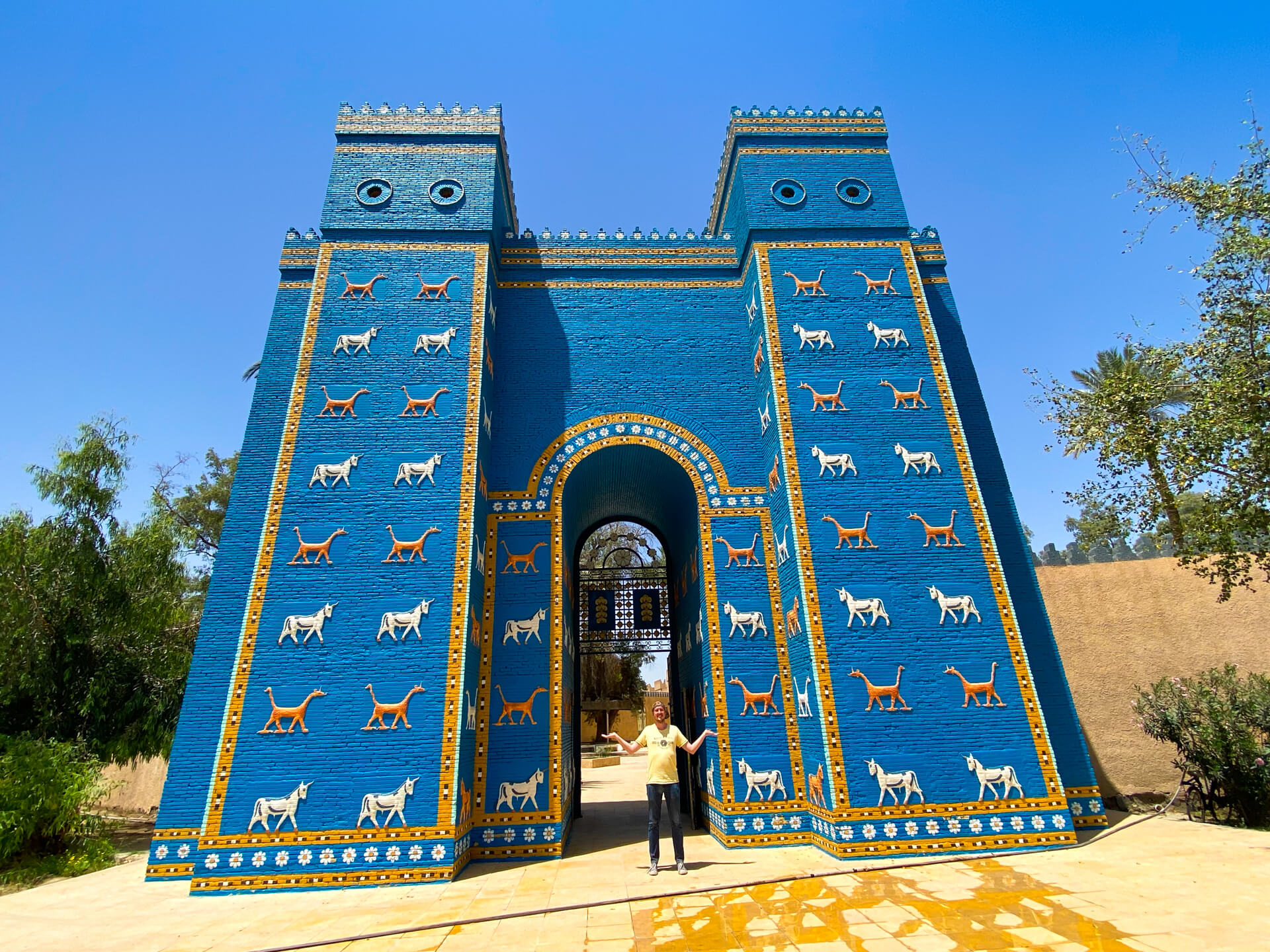
The iconic Ishtar gate. This is actually a replica built by Saddam Hussain (the original is in the Pergamon Museum in Berlin).
While planning the trip, I made a lot of effort to talk with different people inside the country and arranged to hang out with as many as possible while there. This made the trip much easier and gained me access to places, such as Hatra, that we would otherwise have been unable to visit. Independent travel is also much cheaper than a tour. The word on the street is that tours cost anything between $200 and $500 (€165-€450) a day. I spent a total of $920 (€755) in three weeks, excluding the flights and visa, so that works out as just $44 (€36) a day. We weren’t scrimping, but we used public transport most of the time and stayed in mid-range hotels.
During my research, I noticed an almost total lack of up-to-date information on solo travel in federal Iraq, so this article is my attempt to change that. I hope it will help more people to visit this amazing country and fall in love with it the way I did.
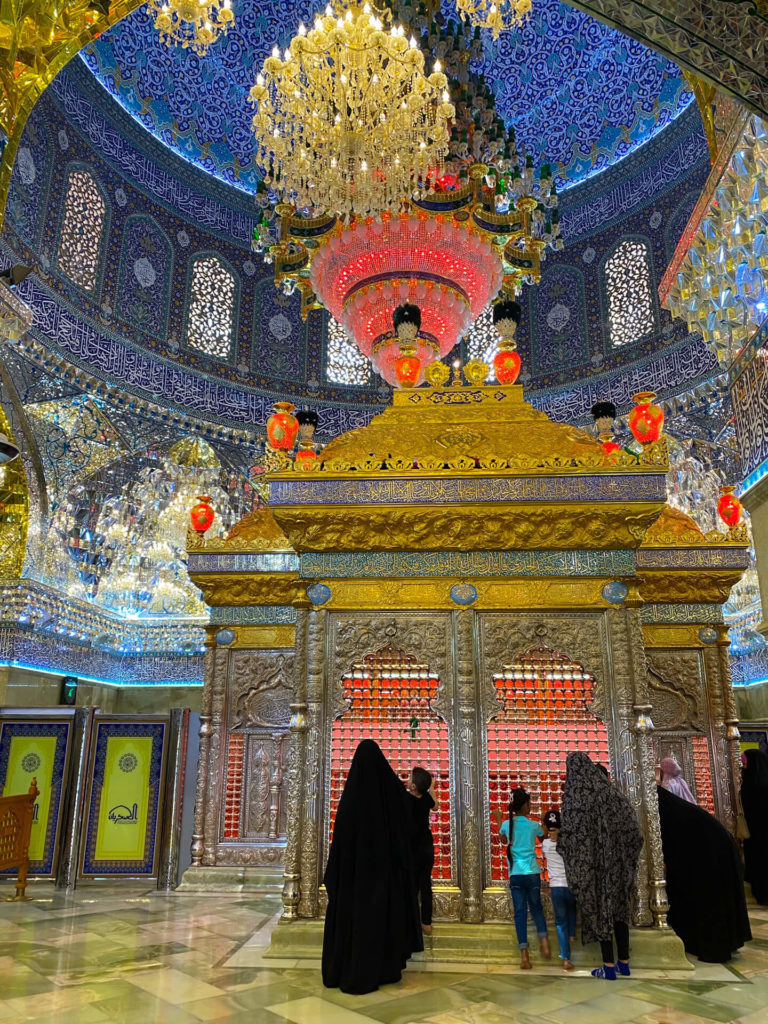
The architecture of the Al Askari Mosque in Samarra is as colourful as it is beautiful.
Itineraries
I have actually been to Iraq twice, once to the Kurdistan region only, back when visas for the rest of the country were almost impossible to get (not to mention the safety issue), and once to federal Iraq. In total, I’ve spent about a month in the country. It has a lot to offer. I’ve now been to all the key places I wanted to see, but would still spend longer visiting further off the beaten track if I had the chance. However, for most people, I would propose the following itineraries.
Federal Iraq Highlights Itinerary (5 Days)
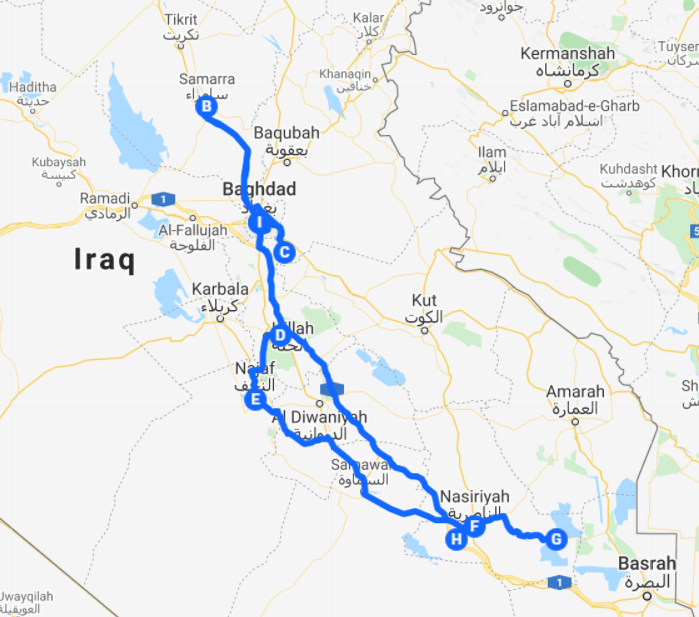
See the best of federal Iraq in five days.
This itinerary will take you through the highlights of federal Iraq in the shortest time possible. Day-by-day, I would suggest the following:
Day 1: Baghdad and Taq Kasra. Get up early to visit the Martyr’s Monument in Baghdad and explore the city. Don’t miss al Rasheed street, the main market (best visited in the morning) and the Iraqi National Museum. In the afternoon, take a short trip to Madain to see the beautiful Taq Kasra, an ancient monument with the world’s largest single-span brick vault arch, built between the third and sixth centuries AD. There are public buses to Madain from the Al Jadeeda district of Baghdad or you can ask a taxi driver to take you there. We paid a random taxi that we hailed on the street 40k IQD to go there and back and have the driver wait for us, but looking back 30k would probably have been enough. In the evening, enjoy traditional Iraqi food at Darbunah restaurant in Karada district.
Day 2: Samarra. Leave early in the morning and take a shared taxi from the Allawi north garage to Samarra to climb the great minaret of the Malwiya mosque, one of the highlights of the trip (entrance 25k IQD). The journey costs 15k IQD and takes about 1.5 hours, although passing the checkpoint into Samarra can take longer. The impressive Askari Shrine shrine is also worth checking out. Wearing an abaya is mandatory for women – they will lend you one free of charge at the entrance.
After returning to Baghdad, take a shared taxi from the Allawi South garage to the city of Hillah (approx. 1 hour, 10k IQD), the get-in point for the ancient city of Babylon. It’s best to stay the night in Hillah, as Babylon doesn’t currently have any hotels.
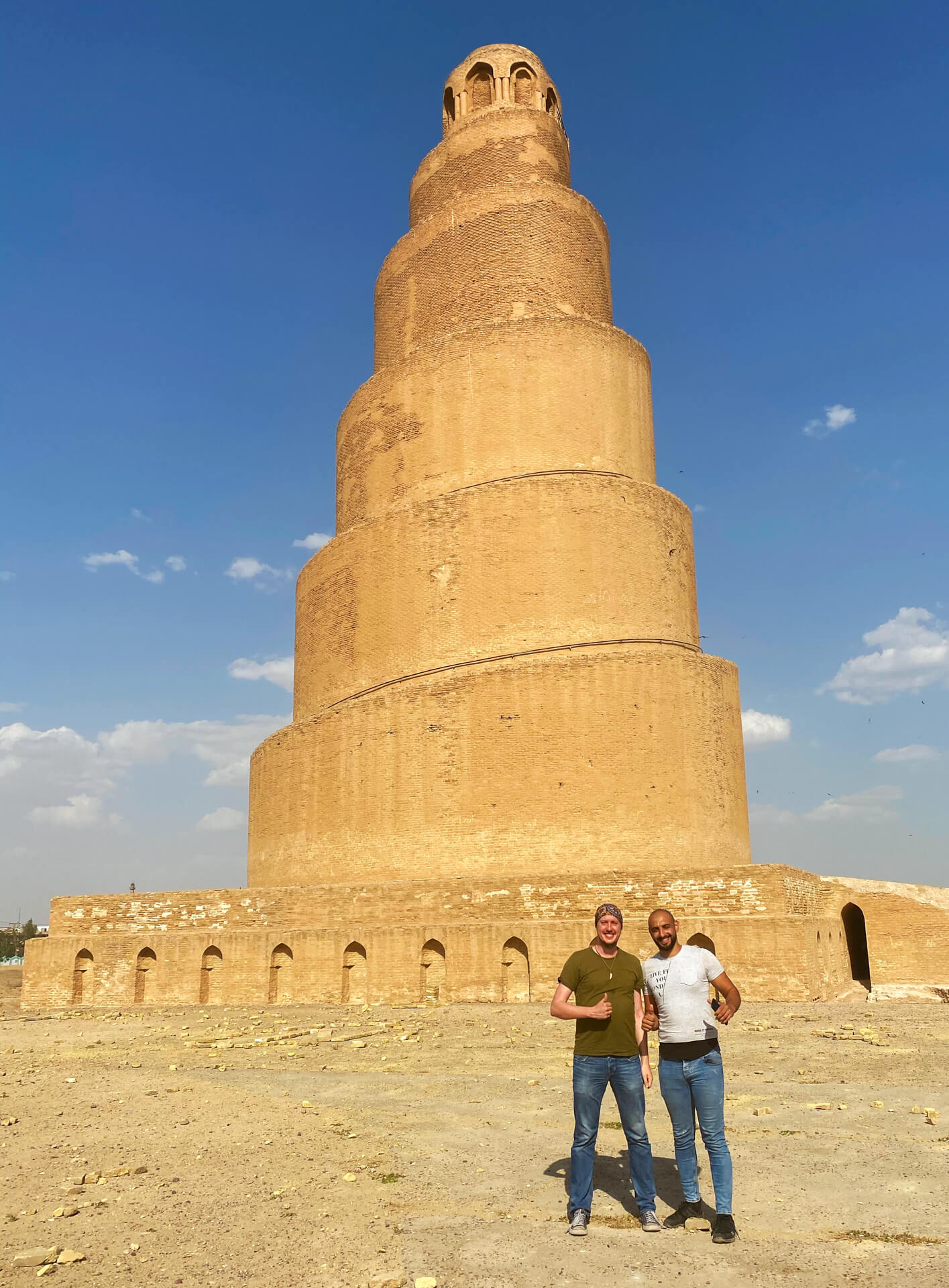
Climbing the beautiful 52m minaret of the Malwiya mosque in Samarra was a highlight of my trip to Iraq.
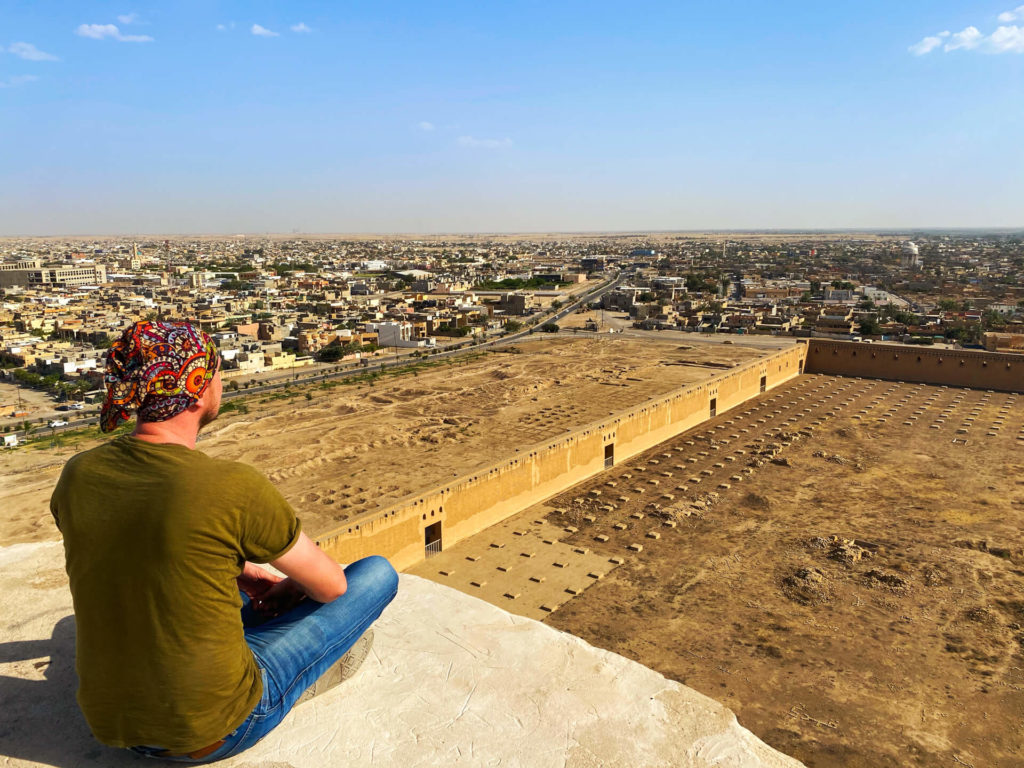
The view from the top of the minaret is impressive and incredibly flat. American snipers once used this point to target insurgents in the city below.
Day 3: Babylon. In the morning, explore the ancient ruins of Babylon, including the Ishtar Gate, the site of the Tower of Babel and Saddam’s summer palace. These are in a historic site a few kilometers from Hillah and can be reached by taxi for 5k IQD. The entrance ticket is 25k IQD.
In the afternoon, take a shared taxi from Hillah to Najaf (7.5k IQD, about 1 hour) and stay there overnight.
Day 4: Najaf. Visit the Imam Ali Holy Shrine, the key religious site of the holy city of Najaf, which many Iraqis refer to as the third holiest city in Shia Islam, after Mecca and Medina, plus the world’s largest graveyard (more than 5m graves) and the Kufa mosque. You could actually visit Karbala instead of Najaf if you wanted – I only included one of them here, as they’re both major religious cities and visiting both would be overkill for a short trip. In the afternoon, head to the Southern Garage (taxi 4k from the mosque area) and take a shared taxi or minibus to Nasiriyah (3-4 hours, 10k for a minibus, 15k for a shared taxi).
Day 5: Nasiriyah – The Mesopotamian Marshes and Ziggurat of Ur. Get up early to beat the heat and visit the Mesopotamian marshes near Chibayish. There are public minibuses running to Chibayish (3k IQD each way) or you can find a taxi to take you and wait while you visit the marshes (approx. 30-40k IQD would be a reasonable price). We went with a local friend, in his car, which was very fortunate. A boat trip through the marshes is the only way to see much and is really worthwhile. The cost will depend on the boatman and your bargaining skills, but is around 25-35k IQD. If you ask around in Chibayish, you will find someone to take you.
Once you get back to Nasiriyah, head to the Ziggurat of Ur. The only option here seems to be to hire a local taxi, which will be around 10k to take you there, wait for you to visit the site, and then take you back to Nasiriyah. Note that tickets cost 25k IQD and should be bought in advance at the main museum in Nasiriyah, which is open from 8am until 2pm. In our case, our friend talked us through the checkpoint to enter the site without tickets, as the museum was not open at the time. Try to have a local contact at least available by telephone to speak to the guards – they always find a solution one way or another.
Finally, take a shared taxi or minibus back to Baghdad from the garage (“Garaj Baghdad Bus Stop” on Google Maps). The journey takes around 4 hours and costs 10-20k IQD.
Of course, you can add or remove bits of this itinerary to fit your interests and available time. Note that one of the downsides (or upsides, depending on how you look at it) to independent travel is that it often takes more time than a tour to cover the same ground, as time gets spent figuring out logistics and waiting for buses/shared taxis to fill up. The main thing missing from this Itinerary in federal Iraq, in my opinion, is Mosul, which is a long way up north, but was definitely a highlight for me, as I am interested in recent history.
Federal Iraq In-Depth Itinerary
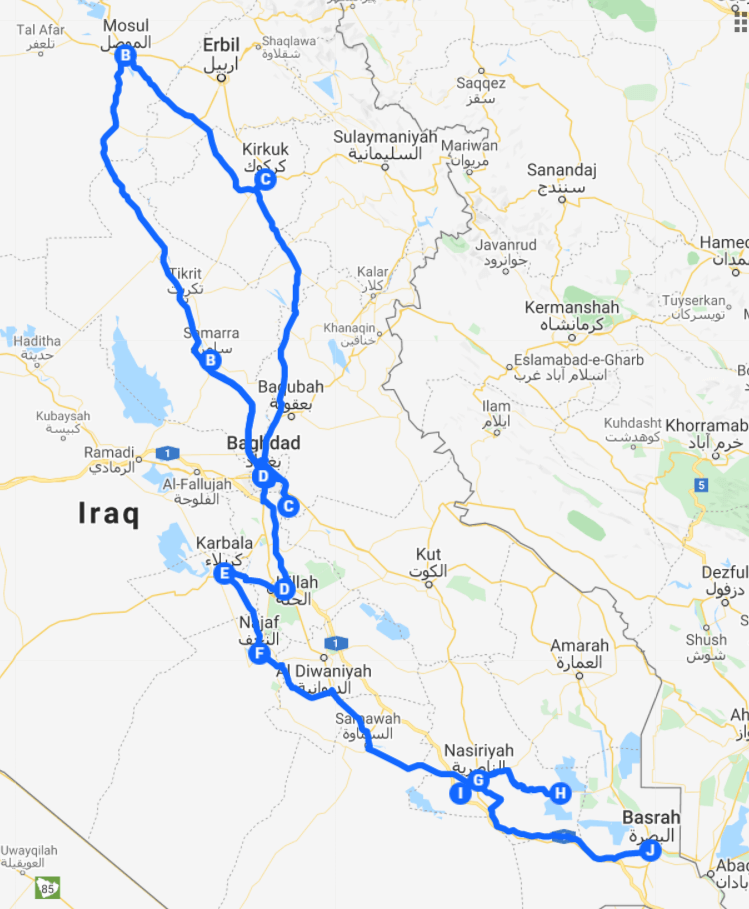
See all the key sights of federal Iraq in one amazing trip.
This itinerary will take you through most of what Iraq has to offer. I haven’t included a number of days for each place, because if you’re doing all these places, you probably have plenty of time, so it’s really up to you. However, 2-3 weeks is probably about right for most people.
Stop 1: Baghdad and Taq Kasra. Baghdad has a whole host of interesting things to visit, including the following:
- The Martyr’s Monument.
- Al Rasheed street, the main market (best visited in the morning).
- The National Museum of Iraq.
- The Save Iraqi Culture monument.
- Firdos Square, where Saddam’s statue was toppled by the US military in 2003.
- Tahrir Square, which also has some interesting graffiti.
- The Kadhimiya shrine.
- Mutanabbi Street book market.
- Shahbandar Café (a traditional tea house).
You can also take a short trip to Madain to see the beautiful Taq Kasra, an ancient monument with the world’s largest single-span brick vault arch, built between the third and sixth centuries AD. There are public buses to Madain from the Al Jadeeda district of Baghdad or you can ask a taxi driver to take you there. We paid a taxi 40k IQD to go there and back and have the driver wait for us, but looking back 30k would probably have been enough.
For great traditional Iraqi food and a vibrant atmosphere, check out Darbunah restaurant in Karada district one evening.
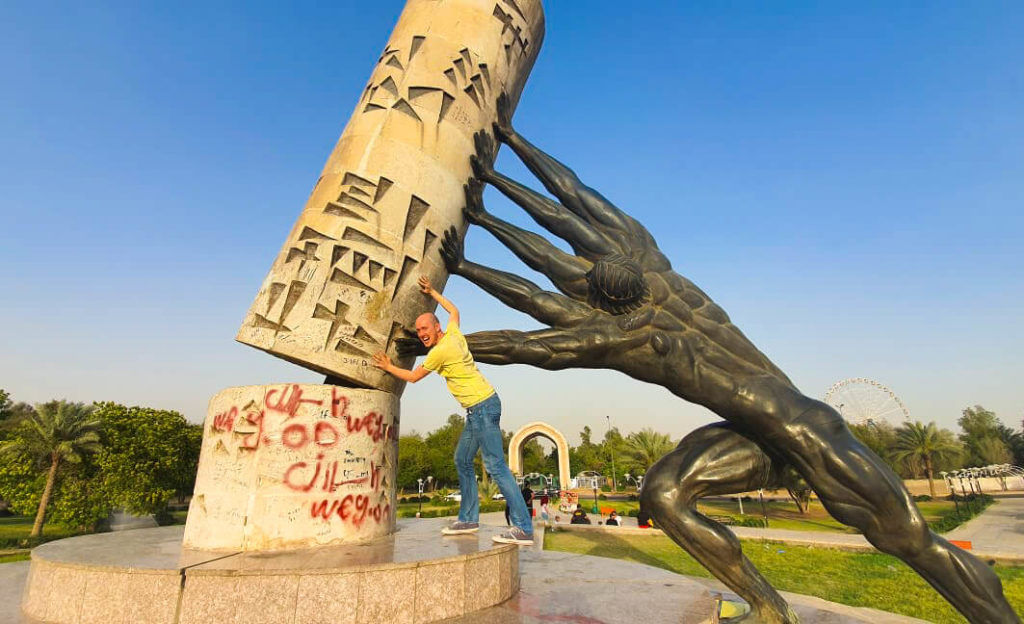
Helping this four-armed dude to save Iraqi culture.
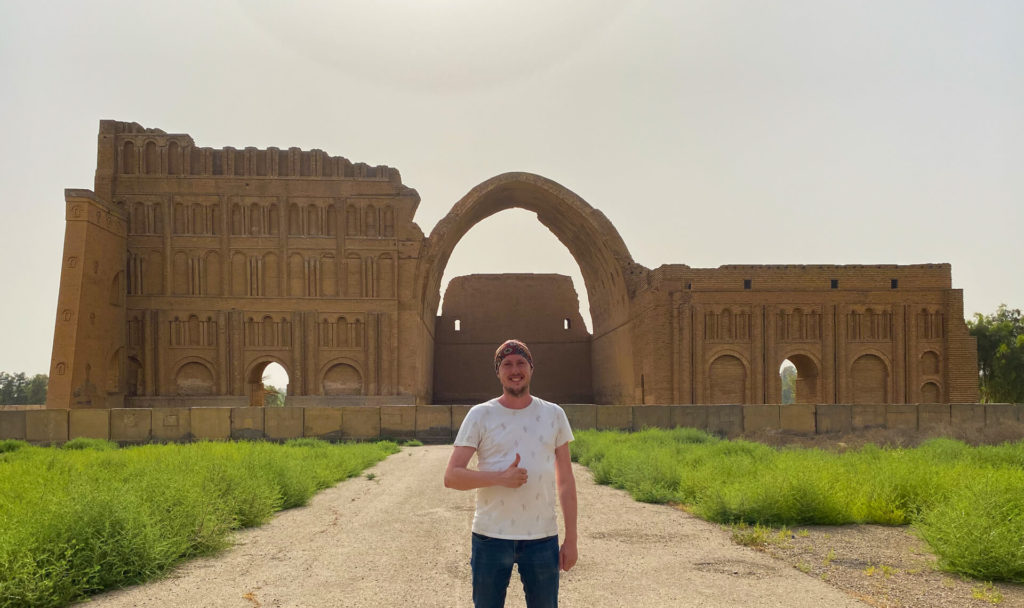
To this day, this is the largest single-span vault of unreinforced brickwork in the world.
Stop 2: Samarra. Leave early in the morning and take a shared taxi from the Allawi north garage to Samarra to climb the great minaret of the Malwiya mosque, one of the highlights of the trip (entrance 25k IQD). The journey costs 15k IQD and takes about 1.5 hours, although passing the checkpoint into Samarra can take longer. The impressive Askari Shrine shrine is also worth checking out. Wearing an abaya is mandatory for women – they will lend you one free of charge at the entrance.
Stop 3: Babylon. From Baghdad, take a shared taxi from the Allawi South garage to the city of Hillah (approx. 1 hour, 10k IQD), the get-in point for the ancient city of Babylon. It’s best to stay the night in Hillah, as Babylon doesn’t currently have any hotels. Hillah itself is nothing special, although the Masjid E Radeshams mosque is worth checking out if you have some free time.
Exploring the ancient ruins of Babylon, including the Ishtar Gate, the site of the Tower of Babel and Saddam’s summer palace, takes about half a day. These are in a historic site a few kilometers from Hillah and can be reached by taxi for 5k IQD. The entrance ticket is 25k IQD.
Stop 4: Karbala. From Hillah, take a shared taxi to Karbala, which takes about one hour and costs a maximum of 10k IQD (shared taxis also depart from Baghdad and Najaf).
Explore Karbala, Iraq’s second holy city after Najaf, and the Al Abbas holy shrine. From here it’s also possible to visit the Al-Ukhaidir Fortress, which is about 50km away in the desert to the west, but means hiring a taxi to take you there.
Stop 5: Najaf. From Karbala, take a shared taxi to Najaf, which takes about one hour and costs a maximum of 10k IQD (shared taxis also depart from Hillah for 7.5k IQD). Explore Najaf, which many Iraqis refer to as the third holiest city in Shia Islam, after Mecca and Medina, plus the world’s largest graveyard (more than 5m graves) and Kufa mosque. Both Najaf and Karbala are religious cities and the mosques and shrines, although beautiful, do get a bit samey after a while. If you’re just going to visit one, I would recommend Najaf, as the location is more on the route from Hillah to Nasiriyah and it’s ‘holier’ than Karbala, according to many Iraqis.
Stop 6: Nasiriyah – The Mesopotamian Marshes and Ziggurat of Ur. From the Southern Garage in Najaf (taxi 4k from the mosque area), take a shared taxi or minibus to Nasiriyah (3-4 hours, 10k for a minibus, 15k for a shared taxi).
Get up early to beat the heat and visit the Mesopotamian marshes near Chibayish. There are public minibuses running to Chibayish (3k IQD each way) or you can find a taxi to take you and wait while you visit the marshes (approx. 30-40k IQD would be a reasonable price). We went with a local friend, in his car, which was very fortunate. A boat trip through the marshes is the only way to see much and is really worthwhile. The cost will depend on the boatman and your bargaining skills, but is around 25-35k IQD. If you ask around in Chibayish, you will find someone to take you.
Once you get back to Nasiriyah, head to the Ziggurat of Ur. The only option here seems to be to hire a local taxi, which will be around 10k to take you there, wait for you to visit the site, and then take you back to Nasiriyah. Note that tickets cost 25k IQD and should be bought in advance at the main museum in Nasiriyah, which is open from 8am until 2pm. In our case, our friend talked us through the checkpoint to enter the site without tickets, as the museum was not open at the time. Try to have a local contact at least available by telephone to speak to the guards – they always find a solution one way or another.
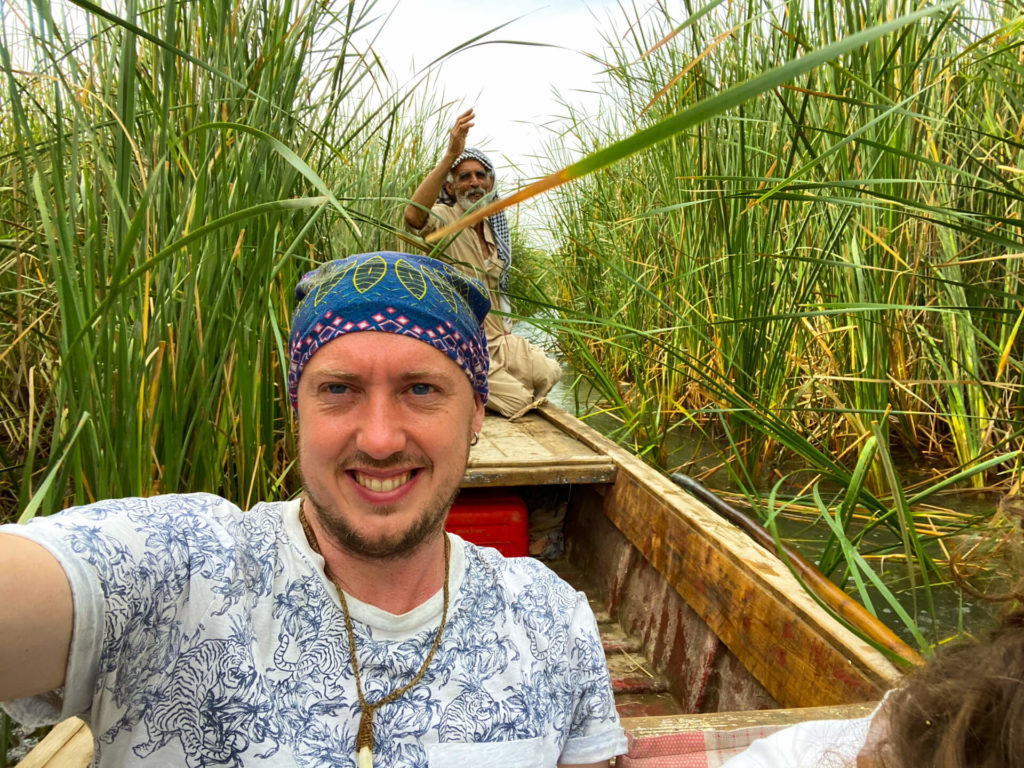
“Everybody duck!” A boat tour through the marshes is a wonderful way to experience a different side of Iraq.
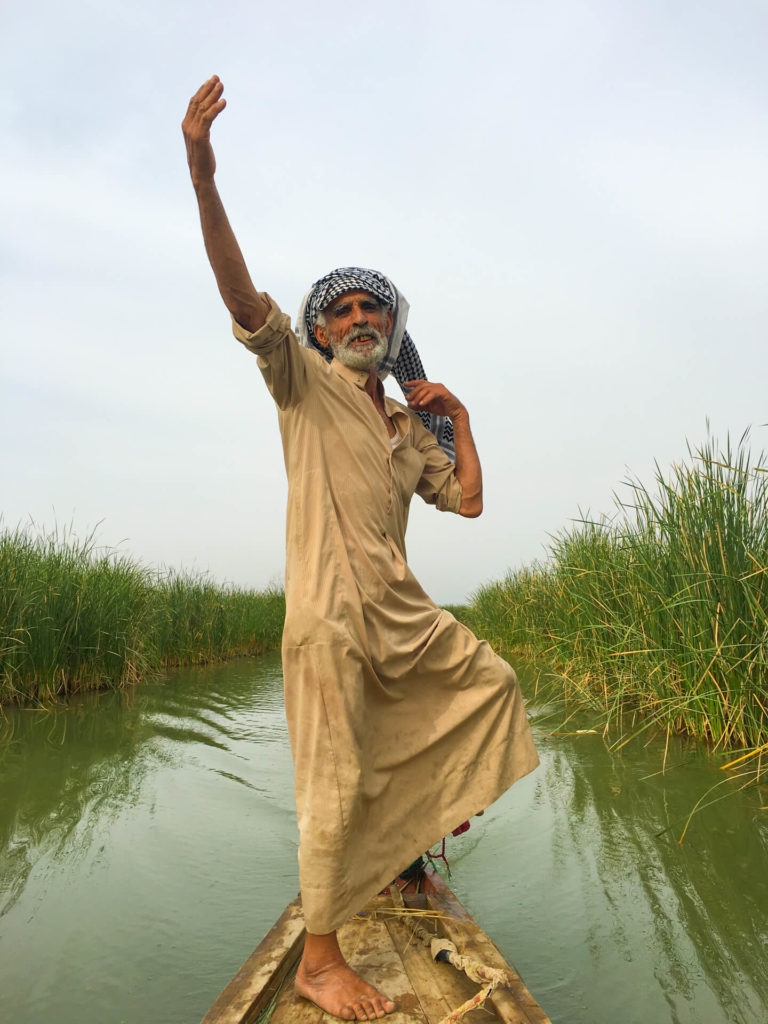
Our charismatic boatman alternated between singing and dancing as he guided the boat through the reeds.
Stop 7: Basra. I wasn’t able to visit Basra due to a Covid lockdown when I was there. However, there are minibuses and shared taxis from Nasiriyah (about 3-4 hours, 10-15k IQD for a minibus, 15-20k IQD for a shared taxi).
From what I heard, there isn’t a huge amount to see in Basra. However, the only train service currently operating in Iraq is an overnight train from Basra to Baghdad, so this is a pretty cool way to return to the capital before heading north. See the section on Trains, below, for full details.
Stop 8: Baghdad again. Arriving back in Baghdad completes the southern loop of the itinerary. With Baghdad being centrally located, you will inevitably pass back through before going up north. I’ve included the southern loop first, as the northern loop of federal Iraq leaves you close to Kurdistan at the end, in case you want to go there afterwards. In my case, I did the northern loop first, as I hadn’t planned to visit Kurdistan on the same trip, so I ended up with a very long journey from Nasiriyah up to Sulaymaniyah after visiting the south.
Stop 9: Mosul. Mosul is a 4-5 hour shared taxi ride from Baghdad (25k IQD from the Allawi North garage) and is the first stop on the northern loop, where fewer travellers venture. If you’re interested in Iraq’s recent history, this is the place to see firsthand the devastation wreaked by the conflict with ISIS. The city is quite safe now, but trailing through the ruins can be a gruelling experience itself.
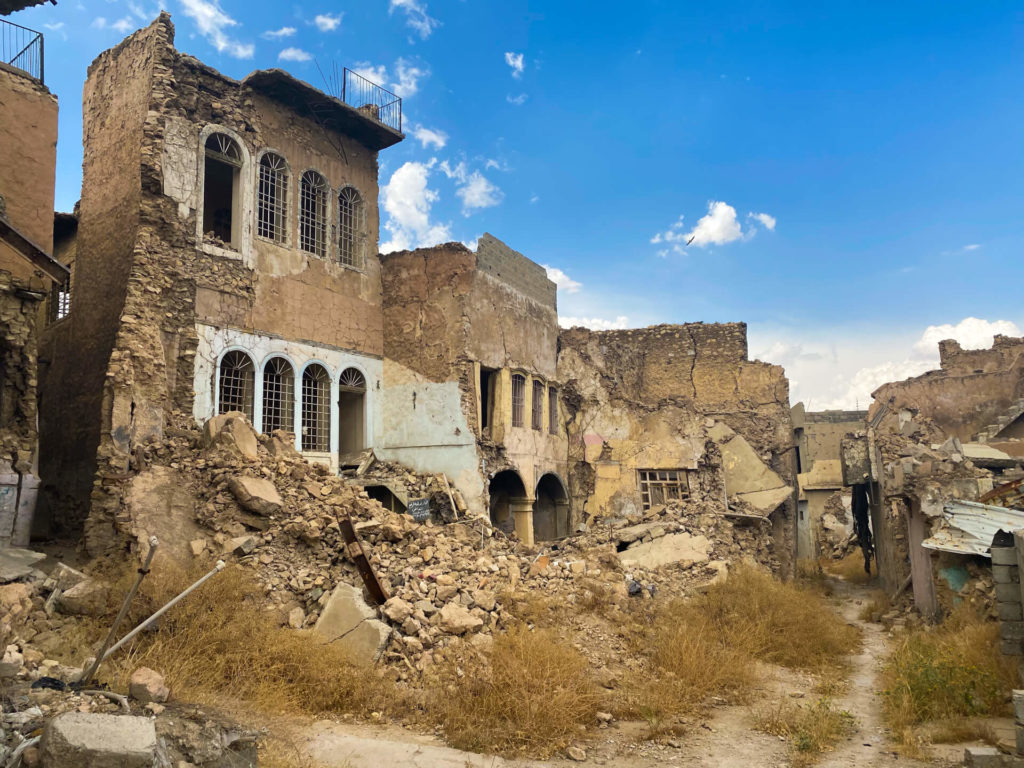
The devastation of the old town of Mosul is a chilling reminder of Iraq’s recent past.
Stop 10: Kirkuk. After a four-hour shared taxi ride from Mosul (15k IQD per person, departing from the North Garage), you’ll reach the city of Kirkuk, the centre of Iraq’s oil industry (along with Basra). The city also has a dilapidated but still interesting citadel and the Qishla, an ancient building that was once the headquarters of the Ottoman army in Kirkuk.
From Kirkuk, you can either return to Baghdad or go on to Sulaymaniyah in the Kurdistan region. Both take about four hours. In either case, shared taxis cost about 15-20k IQD and minibuses about 10-15k IQD and depart from Garage Baghdad.
Kurdistan Extension Itinerary
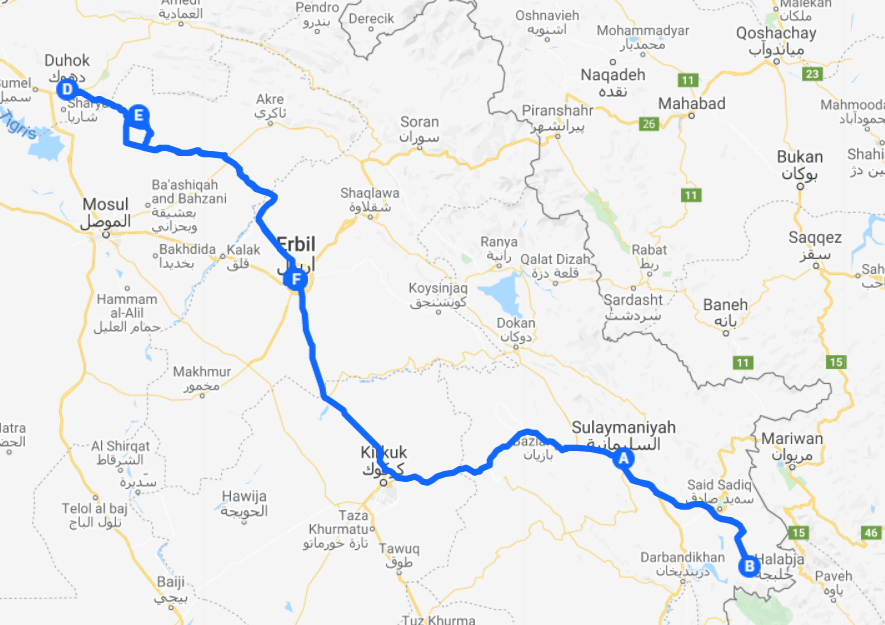
See the best of Kurdistan.
The Kurdistan region is far more used to foreign visitors than the rest of the country, having had a VoA available to many nationalities for years. Hence, travelling is generally easier, as the checkpoints and locals are much more used to dealing with foreigners. The following itinerary can be easily added on to either of the above itineraries for federal Iraq.
Stop 1: Sulaymaniyah. There are shared taxis and buses from the Alnahdha garage in Baghdad all the way to Sulaymaniyah (6-8 hours, 35k IQD for a shared taxi and 25k IQD for a bus) and also from the Garage Baghdad in Kirkuk (about 4 hours, 15k IQD for a shared taxi).
Sulaymaniyah is where Iraqis go to chill, as it’s a few degrees cooler than the rest of the country and has a very relaxed policy on alcohol – apparently Kurdish Christians (and some of the Muslims) drink like fish! Many Iraqi cities have alcohol, but nowhere is it so obvious as here. It also has the Amna Suraka museum, which used to be a prison where Kurdish prisoners were tortured under Saddam Hussain, and is a good base for day trips to Halabja and Dukan lake. I also thoroughly recommend climbing Amzar mountain, next to the city, to watch the sunset (there’s a cable car for the non-hikers).
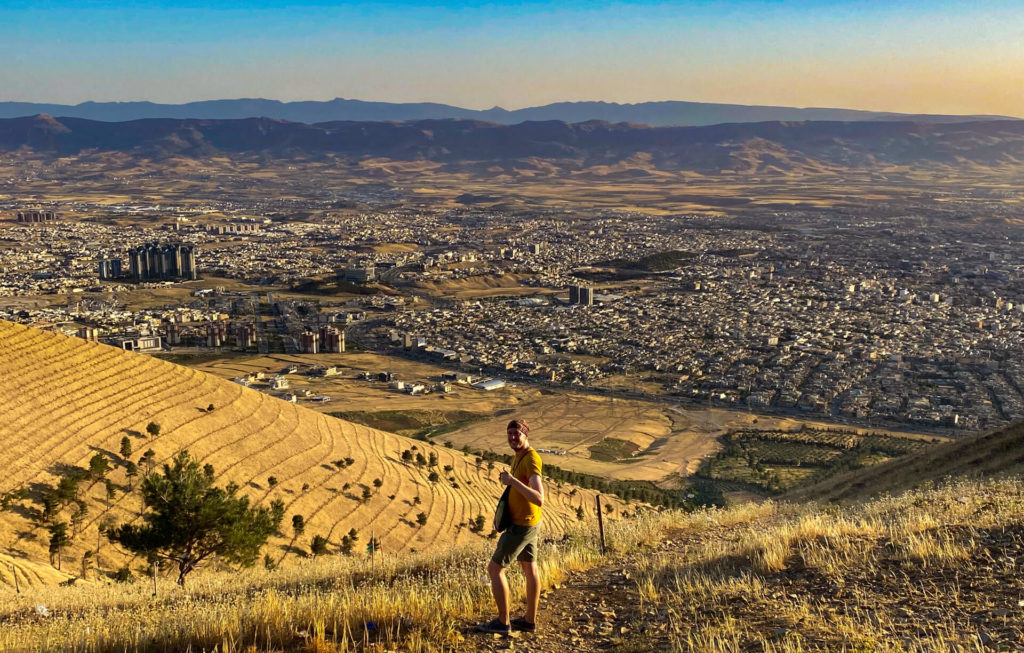
Enjoying the evening view over Sulaymaniyah from the top of Mt. Amzar.
Stop 2: Erbil. The capital of the Kurdish region is about four hours by shared taxi from Sulaymaniyah (15k IQD or 20k for the front seat). It boasts the oldest continually inhabited city in the world (the old citadel, which is in better condition than Kirkuk’s), a beautiful main square, and the grand bazaar with the historic Mam Khalil tea house hidden inside. Ask locals inside the bazaar for directions to the tea house, as the maze of alleyways is impossible to navigate using Google Maps.
Stop 3: Dohuk. The city of Dohuk is another four-hour shared taxi ride from Erbil (15k IQD or 20k for the front seat) and is the get-off point to Lalish, the Mecca of the Yazidi people. The Al Qosh and Mar Mattai monasteries and the beautiful town of Amedi are also close by. I’m not aware of public transport to these sites, so your options are hiring a taxi, hitchhiking or hiring a car (see details below).
On a side note, if you’re interested in what the Yazidi people went through under ISIS, I’d recommend The Girl Who Escaped from ISIS by Farida Khalaf and Andrea C. Hoffmann. It’s definitely not easy reading, but gives some pretty stark insights into life under ISIS and their impact on local communities, especially the Yazidi.
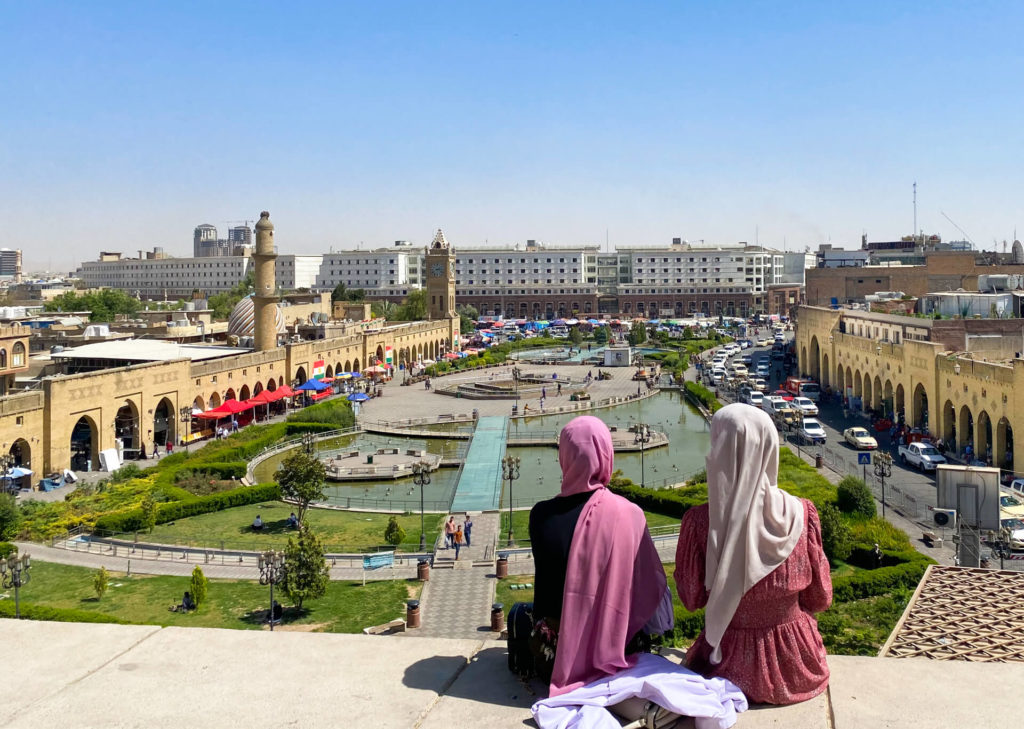
Two Iraqi girls admire Erbil’s main square from the citadel.
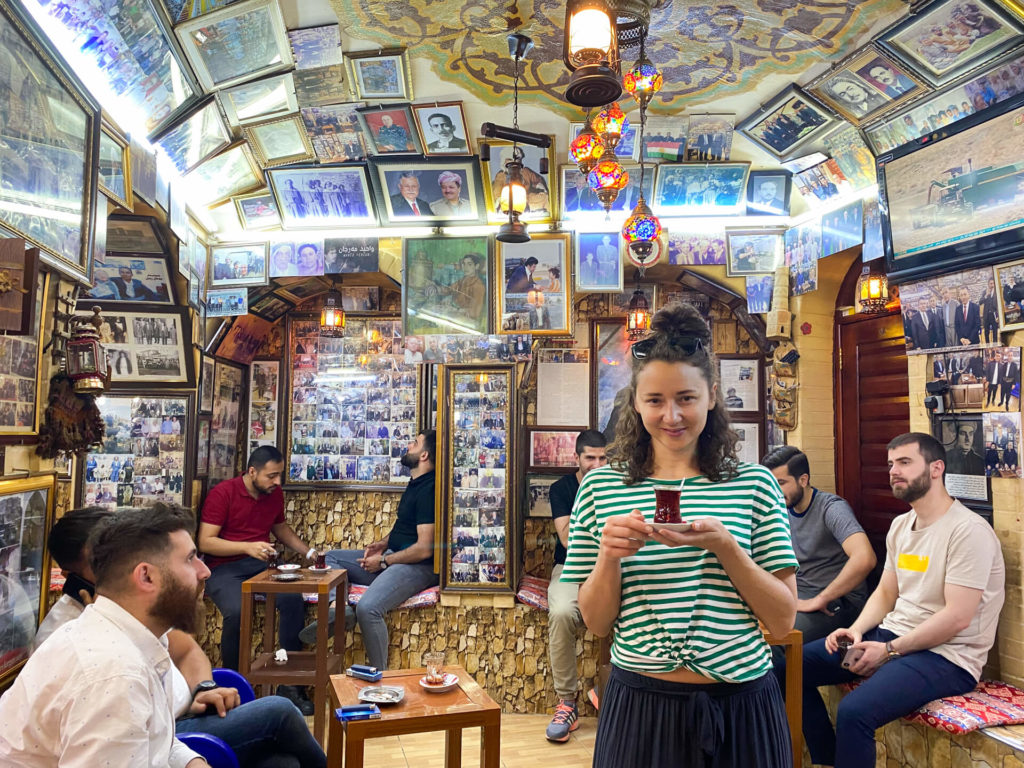
The historic Mam Khalil tea house in Erbil. Anna doesn’t usually drink tea, but she did here!
Travelling in Other Areas of Iraq
If you’ve done all of the above, there’s not much you haven’t seen in Iraq! Some independent travellers I’ve spoken to have also made it to Tikrit, Hit, Ramadi and Hatra, which I was able to do thanks to a friend with really solid contacts. However, these places are less-visited (or should that be, even less visited) and being able to enter through the checkpoints is hit and miss. But, if you want to see even more off-the-beaten track parts of the country, my advice would be to give it a shot.
Difficulty of Independent Travel in Iraq
For experienced travellers, Iraq is not a difficult place to travel independently. It’s much easier than Afghanistan or Papua New Guinea, for example. The main challenges are language, as not many people speak English, and a lack of formal tourist infrastructure. Military checkpoints are everywhere and, although most soldiers are very friendly, dealing with them can be daunting if you haven’t been in a similar environment before.
I would not recommend Iraq for inexperienced travellers – if you’ve not travelled outside of Europe or North America before, this is not the place to start. It’s also good to have some prior experience travelling in the Middle East, as it puts the culture in perspective. Lebanon, Jordan and Palestine are all easier and safer places to start. However, if you’ve travelled a few places where you didn’t speak the language and are comfortable dealing with friendly soldiers, then Iraq is not too challenging.
Entry Requirements: Visas and Residency Registration
A 60-day visa on arrival (VoA) is available to passport holders from the five permanent members of the UN security council (the US, UK, France, Russia and China), all EU member states, and the following additional countries: Japan, South Korea, New Zealand, Canada, Australia, Switzerland. Citizens of Bahrain, Kuwait, Lebanon, Oman, Qatar, Saudi Arabia, and the UEA can obtain a VoA only at Basra and Najaf airports.
The VoA is available at Baghdad, Najaf and Basra airports and at the land borders with Iran, Jordan and Kuwait and costs $77. In our case, they had change, but some travellers have commented that this wasn’t the case, so it’s best to have the exact fee, if possible. Some of the USD notes I gave them were not in pristine condition and this didn’t cause any issue at all.
The full Iraqi VoA lets you travel freely between federal Iraq and the Kurdistan region. However, if you enter Iraq though the Kurdistan region (Erbil and Sulaymaniyah airports or by land from Turkey), you can only obtain the Kurdistan VoA, which doesn’t permit travel to the rest of Iraq (including Mosul). It costs $75 and lasts 30 days. If you have this visa, the only way to enter federal Iraq is to take a domestic flight to Baghdad, Najaf or Basra, where you can obtain the full Iraqi visa (and pay again). Therefore, it’s better to enter through federal Iraq unless you only plan to visit Kurdistan.
A few travellers have reported being asked to provide a hotel booking from a list of approved hotels when flying into Federal Iraqi. Then, when they cannot produce a booking, the immigration officer asks them to pay a fine (usually $50). This is a scam. Calmly stand your ground and insist politely that this is not required.
According to the federal Iraq visa sticker, you’re supposed to register your residency if you stay more than ten days in the country. However, no one checks this and it doesn’t cause issues when you leave (I stayed for 3 weeks and had no problem).
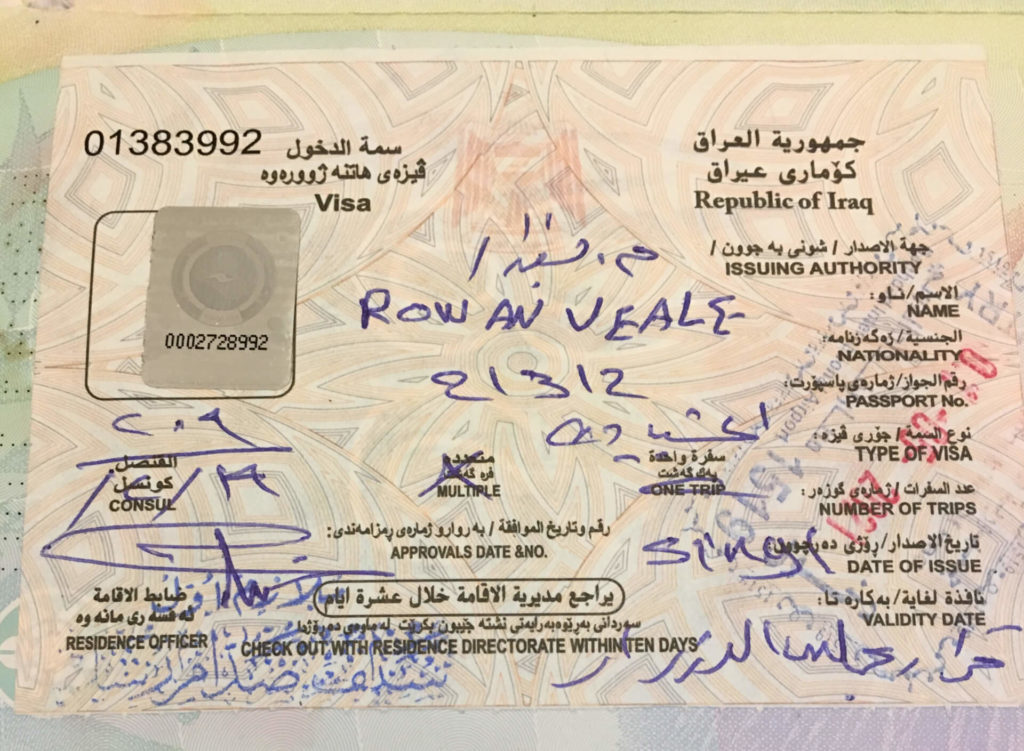
The Iraqi VoA – not the most beautiful visa in the world, but just the word Iraq gives it a certain mystique!
Entry Requirements: Covid 19
All travellers entering Iraq must have a valid Covid-19 vaccination certificate or a negative PCR test. Accepted vaccines are AstraZeneca, Covaxin, Covieshield, Covovax, Janssen, Moderna, Nuvaxovid, Pfizer, Sinopharm, Sinovac and Sputnik V. PCR tests must be taken within 72 hours of departure if entering to federal Iraq or 48 hours of departure if entering to the Kurdistan region.
Since 1 April 2022, a negative PCR test is no longer required to depart Iraq or to enter Iraqi airports. There is absolutely no problem flying out of airports in the Kurdistan region with an Iraqi VoA from the non-Kurdish part (Anna and I both did this).
Land Border Crossings
Currently, the following land borders are passable by foreign tourists:
- Border between Turkey and Iraqi Kurdistan. For eligible nationalities, the Kurdistan visa-on-arrival is available when entering Iraqi Kurdistan by land from Turkey. You can also cross from Kurdistan back to Turkey via this border, as long as you meet immigration requirements for entering Turkey.
- Border between Iran/Jordan/Kuwait and Federal Iraq. For eligible nationalities, the full Iraqi visa-on-arrival is available when entering Iraq from these countries.
Iraq’s land borders with Syria and Saudi Arabia are currently not passable by tourists, as far as I am aware.
Transport from Baghdad Airport to the City
After exiting the airport, I looked for a minibus to Abbas Ibn Firnas Square, which is just outside of the airport security zone, but all I found were taxi drivers offering rides to my hotel for 30k IQD. “There are no more buses,” they said, “it’s too late.” That didn’t make any sense, given how many people were still waiting for visas in the airport, so I waited a bit and then, sure enough, two minibuses turned up just outside the entrance to the arrivals area. I paid 9k IQD to Abbas Ibn Firnas Square, because one seat was empty. The normal price is 8k IQD per person.
From Abbas Ibn Firnas Square you can take a taxi for what should be a lower price than from the airport itself, but you will have to bargain, or use the Careem or Obr taxi hailing apps. The airport area itself is closed to normal taxis, which is why you need to take the minibus to Abbas Ibn Firnas Square first. In my case, two guys from the Iraqi Travellers Cafe picked me up and took me to my hotel, after which we spent the rest of the day hanging out by the Tigris river.
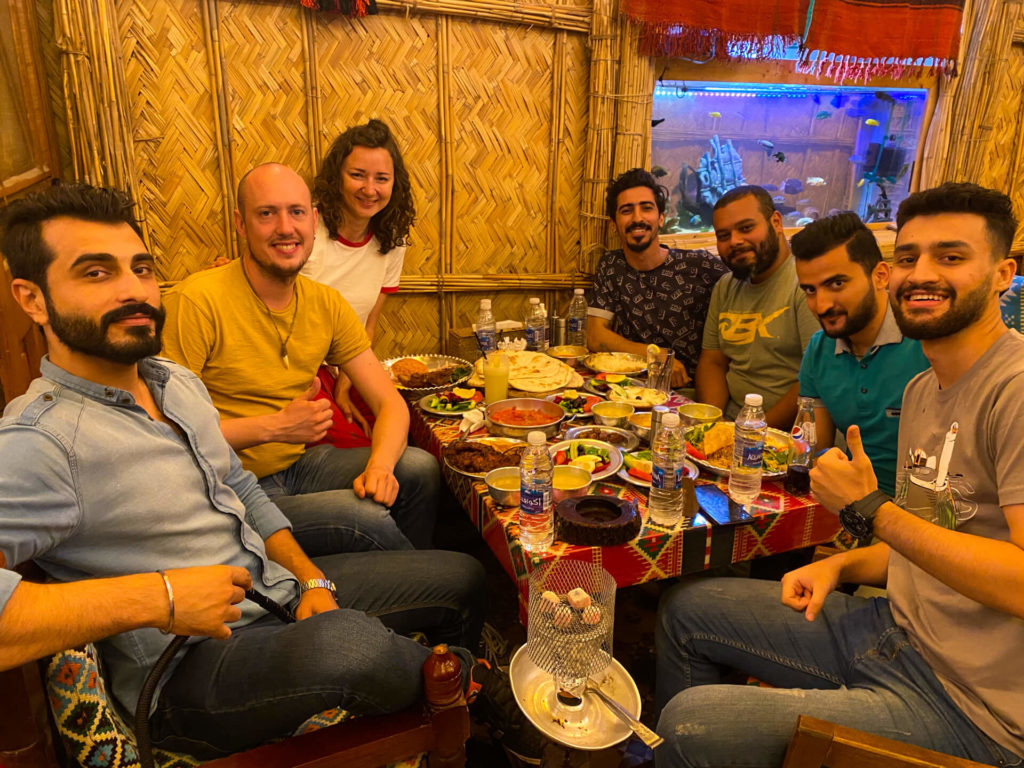
Good food and good company – eating at Darbunah restaurant in Baghdad with new friends from the Iraqi Traveller’s Cafe.
Money and ATMs in Iraq
The currency in Iraq is the Iraqi Dinar (IQD) and, although it has depreciated a bit over the past few years, it’s relatively stable at the moment. Exchange rates varied, but the worst I came across was 1,400 IQD to the USD, in the airport (of course!). I changed $100 here and the rest at better rates later. Outside of the airport, rates varied from 1,450 to 1,485 IQD to the USD.
To save finding exchange offices all the time, we often paid for hotel rooms in USD and let the hotels give us change in IQD. The rates were more-or-less the same. Try to take $100 notes with you, as we did find that many places gave worse rates for smaller denomination notes (1,150 IQD to the USD in one case in Erbil, for a $10 note, although shopping around I eventually got 1,400).
ATMs that accept foreign bank cards are few and far between and I would recommend bringing enough USD cash for the whole trip, if possible. In Baghdad, the Commercial Bank of Iraq ATM on Saadoun street apparently accepts foreign cards and in Kurdistan we found that the BBAC bank ATMs worked (you can find the locations on Google Maps). Note that some travellers have reported that Revolut cards do not work in Iraq.
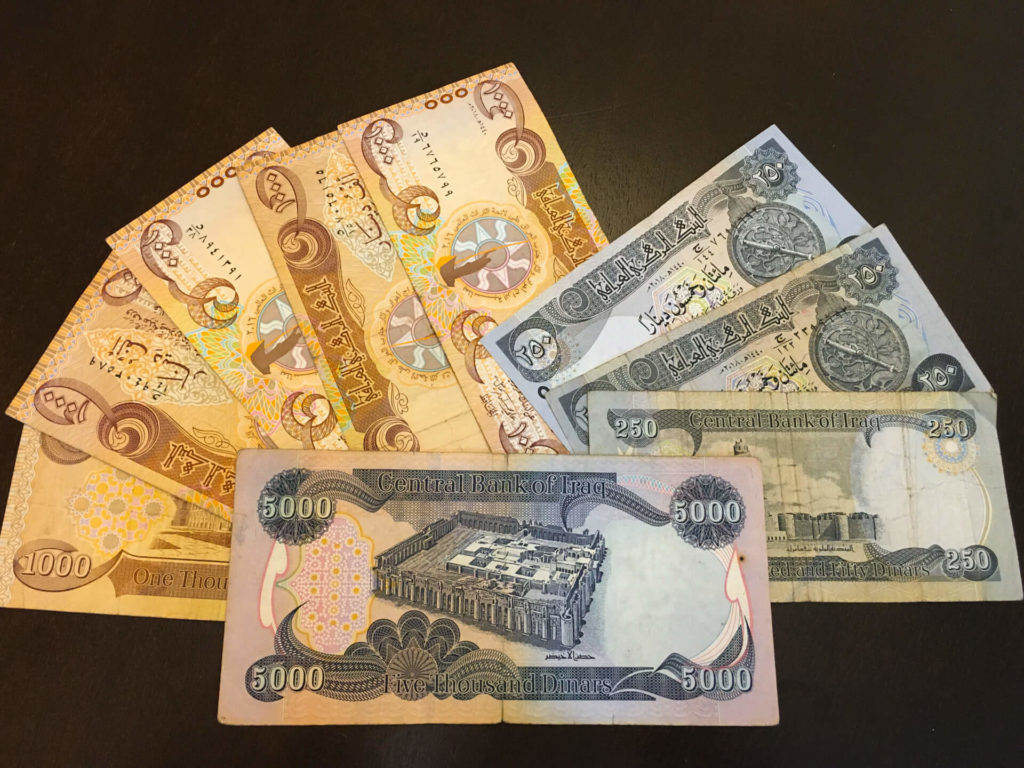
Iraqi currency – the dinar.
SIM Cards in Iraq
SIM cards can be difficult to find. There are mobile shops everywhere, but many don’t stock them. We bought ours from a shop called Passion Mobile Office in Karada district. They were very friendly and spoke a bit of English.
The network we used was Korek and we paid 5k IQD for the SIM and 18.5k for 20GB of data for one month. They worked fine in the north of Iraq, including Kurdistan, and the major cities of the south, but frequently had weak or no signal in rural parts of the south. Apparently, AsiaCell is the best network if you want good coverage across the whole country, but we didn’t know this at the time.
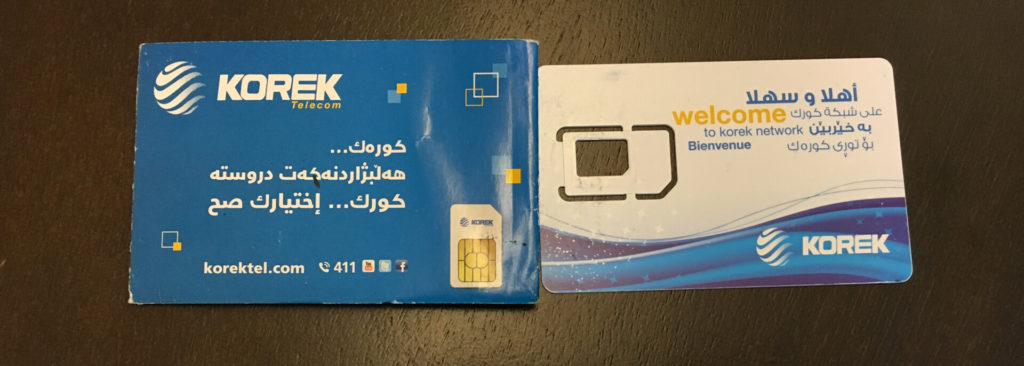
The Korek SIM even came with English-language instructions.
Public Transport in Iraq
Before I visited Iraq, a local tour guide told me that, “Iraq doesn’t have public transport.” Somehow, I didn’t quite believe that every Iraqi had their own car or hired a private car and driver to move between cities, so I asked around and, of course, public transport is plentiful.
Transport between cities generally consists of shared taxis and various sizes of minibus. Shared taxis are around 10k-25k IQD per seat, depending on distance, and leave frequently throughout the day between most major cities. Minibuses are slower and usually take longer to fill up, but are also cheaper. A four-hour journey is often around 10k, depending on the size of the minibus.
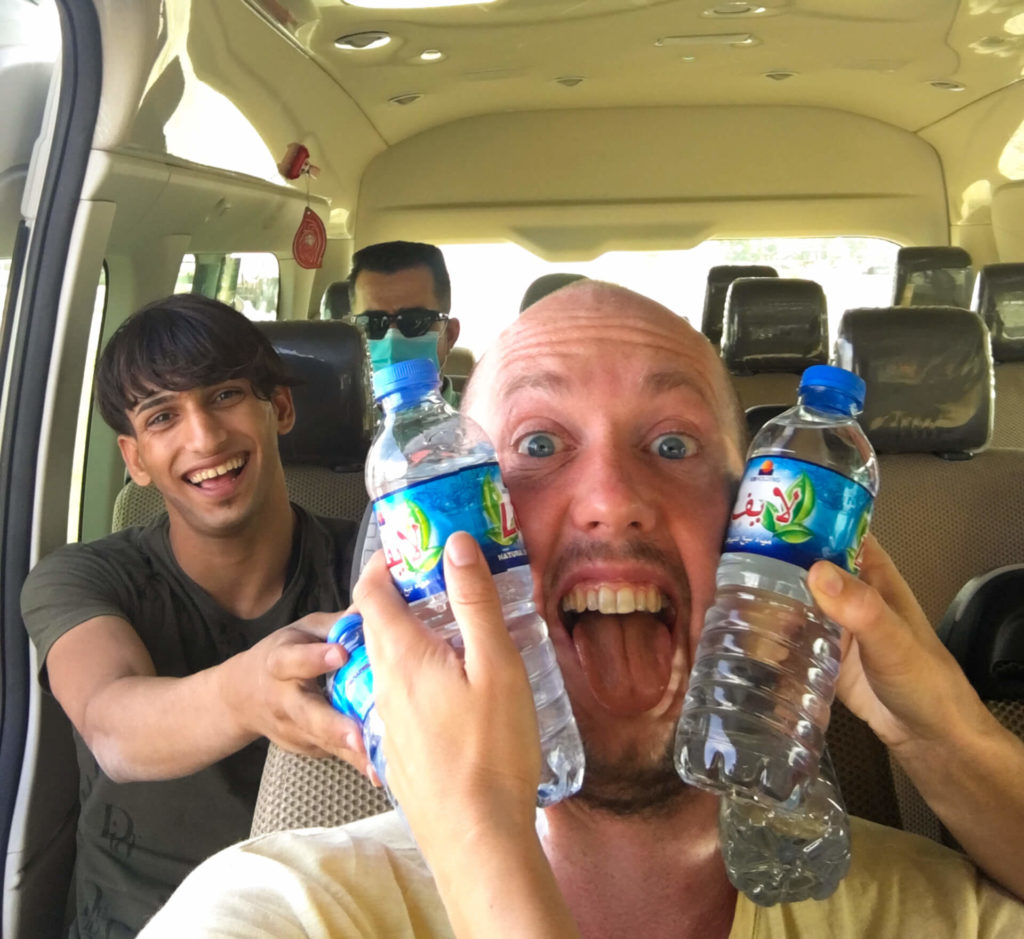
Cooling off with water bottles on the bus from Baghdad to Sulaymaniyah – the Iraqi kid behind me thought this was a great game!
Minibus and shared taxi stations are known locally as garages and each city has at least one. Baghdad is a bit complicated as there are two, with Allawi garage being split into Allawi North and Allawi South, which are on opposite sides of the road from each other. All are marked on Google Maps. At most of them, you’ll be mobbed by people offering you their private taxi. Be firm and say that you want a shared taxi and they’ll usually help you find the right car. Shared taxis are usually (but not always) painted yellow.
The three garages in Baghdad are as follows:
Alnahdha Garage: Shared taxis and minibuses leaving for anywhere in the north of Iraq, including Erbil and Sulaymaniyah in Kurdistan, except along the road to Mosul, which also includes Samarra and Tikrit.
Allawi North Garage: Shared taxis and minibuses heading north along the road to Mosul, including to Samarra and Tikrit.
Allawi South Garage: Shared taxis and minibuses to anywhere south of Baghdad, including Hillah, Karbala, Najar, Nasiriyah and Basra.
Trains In Iraq
The only passenger train currently known to be operating in Iraq is between Baghdad and Basra. It’s supposed to run daily, but the word is that it’s actually only operating on Fridays, Saturdays and Sundays at present. From Basra, it departs at 7pm from the main railway station, arriving around 6am the next day in Baghdad. The train from Baghdad in the other direction also departs at 7pm from Baghdad’s main train station and arrives in Basra around 6am.
Go to the train station to buy the tickets (10k IQD for a seat and 40k for a sleeper). Further details can be found at: https://www.seat61.com/Iraq.htm.
Hitchhiking in Iraq
One option that we didn’t try between cities is hitchhiking. However, I’ve spoken with a few people who’ve done it and it’s very easy, as Iraqi people are friendly and happy to help foreigners. Although we didn’t hitchhike, in both Baghdad and Najaf, we had occasions where private cars stopped as we were walking down the street and then gave us a lift to our destination. No one asked for money.
Taxis and Ride Hailing Apps in Iraq
The Careem and Obr Taxi ride hailing apps work in Baghdad and some other major cities, including Najaf and Erbil. However, apart from at the airport, Iraqi taxi drivers were a fairly honest bunch. They would usually quote a slightly high price, I would counter with a price that was obviously too low and then we would agree something in the middle. Generally, within Baghdad, prices were 5-10k, depending on distance. Other cities, including in Kurdistan, were cheaper – usually around 3-5k.
For men, sitting in the back of the taxi is highly frowned upon if the front seat is empty, as it is considered demeaning. Sometimes taxi drivers will even demand that you move to the front. For women it can be the opposite. During one long-distance journey, Anna moved to the front seat because she was feeling car sick in the back and a soldier at a checkpoint asked me, with genuine surprise and confusion, “sir, why do you permit your wife to sit in the front?” I told him he should see what happens if I try to stop her!
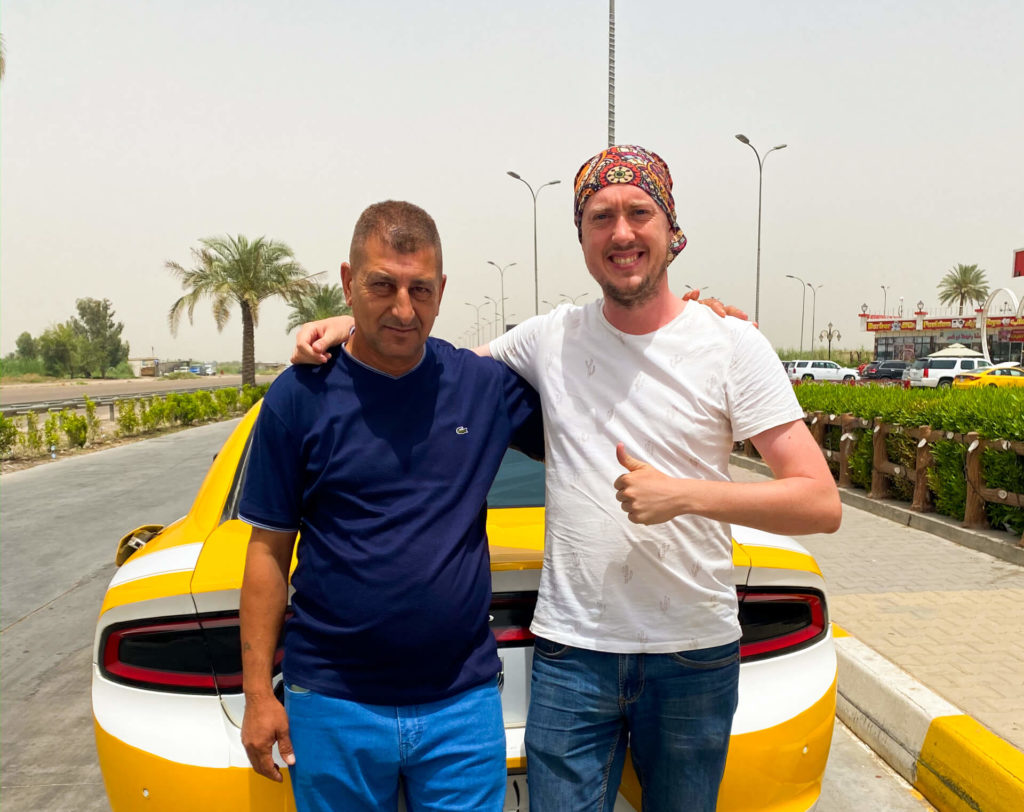
Chilling with our taxi driver from Nasiriyah to Baghdad.
Car Rental In Iraq
It is possible for foreigners to rent cars in both the federal and Kurdistan regions of Iraq. Prices start at around $30 a day, including insurance, depending on the type of car. The rental agency will give you a document proving that you are authorised to drive the vehicle. Make sure that you receive this, as you may be asked for it at checkpoints.
Renting a car is a really cost-effective way to see the northern parts of Kurdistan where public transport is scarce, as hiring a taxi for a day, even with local contacts, is around $100. Having your own car also gives you far more freedom. You will need an International Driver’s Permit (IDP) and the rental company may also block a deposit on your credit card. Road and driving standards vary a lot and many people drive like maniacs, so be careful.
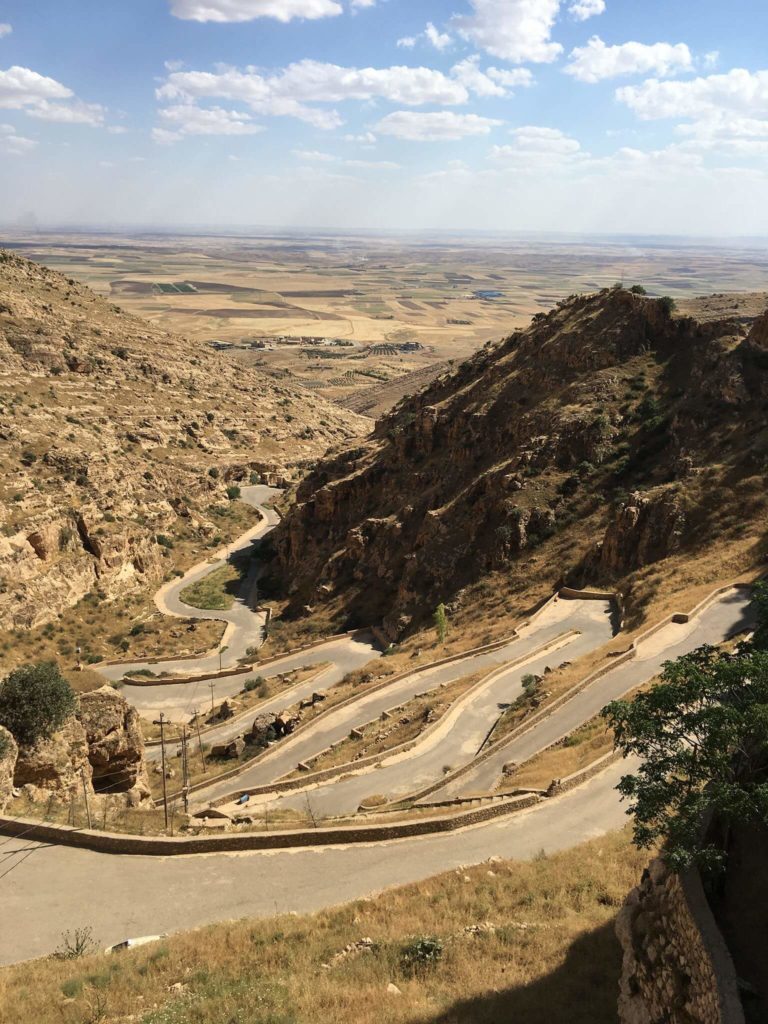
Test your driving skills on the road to the Al Qosh Monastery.
Road Checkpoints in Iraq
Outside of the Kurdistan region, there are a lot of checkpoints (and even in Kurdistan, there are some). Often, the soldiers manning them don’t really know what they’re supposed to do with foreignn tourists, because there are so few. They will ask a lot of (often completely irrelevant) questions and then let you pass. In our three weeks in Iraq, we must’ve passed around 50 checkpoints and not once were we denied passage. Samarra was the most time consuming, because the city is run by a militia, not the government. The checkpoint to enter Mosul was surprisingly relaxed and, apart from a few questions, gave us no problems at all.
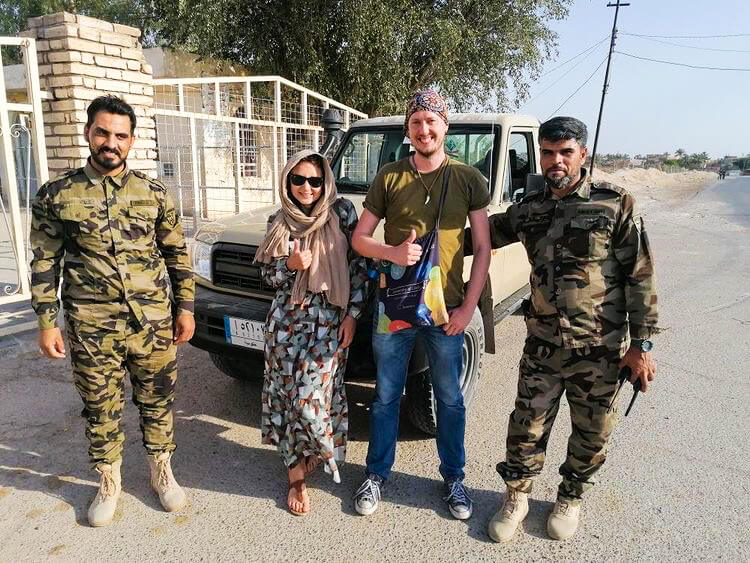
The soldiers at the checkpoints in Iraqi were almost all really friendly.
The general rule is smile, be patient and eventually the soldiers will let you pass. This country still has dangerous terrorists camping in the hills in some areas, and plenty of ISIS members came from western countries (including Australia), so it’s not surprising that they want to ask a few questions. It’s also good to have an Iraqi friend you can call as a last resort. In one case, we had the soldiers demand that we do this, because they didn’t speak any English.
We did our best to blend in while passing checkpoints, because often, if the soldiers didn’t notice that there were foreigners on the bus, we didn’t even have to stop. Anna usually put a scarf over her head when she saw a checkpoint coming (and took it off again immediately afterwards) and I was wearing sunglasses some of the time. This worked better for Anna than me, but definitely helped.
A couple of checkpoints have special requirements:
Samarra: It is normal for the checkpoint at the entrance to Samarra to keep your passport while you’re in the city and then return it to you when you leave, so don’t worry if this happens. They give you a kind of ticket to show at checkpoints inside the city instead. However, we were allowed to keep ours and another independent traveller that visited just after us was also allowed to keep his, so this practice seems to be becoming less common.
Nasiriyah: Unlike other Iraqi cities, Nasiriyah had a requirement that you know someone who lives there to enter the city. However, as of February 2022, this requirement has been relaxed.
Knowing Iraqi People is Awesome
Who you know makes a huge difference in Iraq. If you’re travelling with a tour group or guide, they’ll likely have all the contacts you need. However, if you’re travelling independently, putting in a bit of effort to get to know a few locals makes a huge difference (and is a lot of fun). Starting from one guy in Mosul that I spoke to on Couchsurfing, who knew someone at the Iraqi Travellers’ Cafe in Baghdad, I was eventually able to build a whole network of contacts that helped me out and gave me people to hang out with in every city I visited.
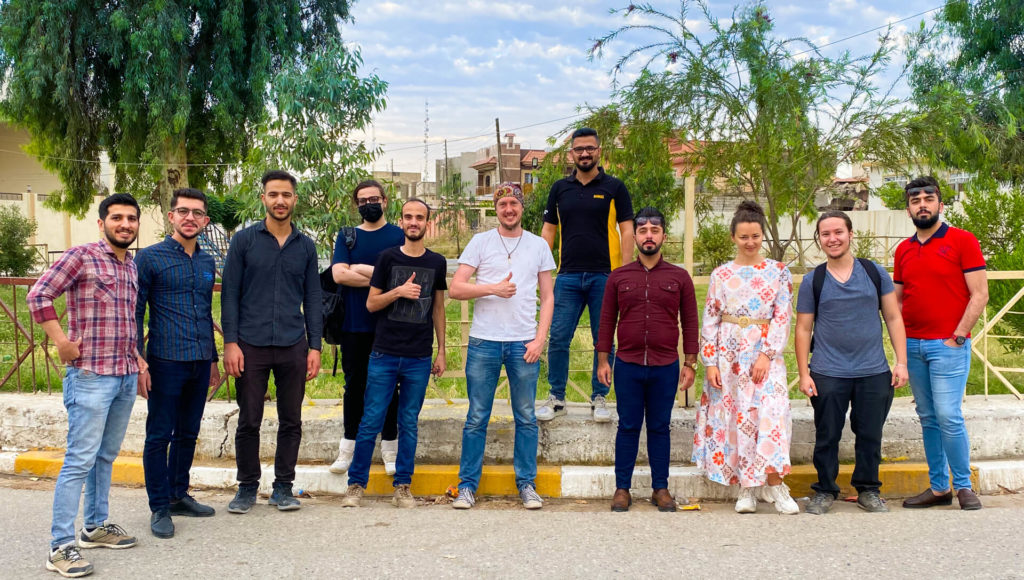
Rag tag team – Group selfie before heading to Hatra.
Iraqis are very friendly and many, especially the younger generation, genuinely care about repairing their country’s tattered reputation and encouraging tourists to visit, so they will bend over backwards to help you. In many cases, this is completely for free, although we still insisted on paying for meals and other activities where possible. Sometimes, we also helped out our Iraqi friends indirectly by participating in their activities.
For example, in Kirkuk, we hung out with an awesome guy called Mohammed who was able to get us access to the citadel, despite it being temporarily closed. When we visited it, we were interviewed by an Iraqi television station that he has connections with and, afterwards, we spent an hour talking with his volunteering group. These activities were interesting for us, but are also a way of reciprocating for the help that Mohammed gave us, in that they help build his standing in the local community.
The network of contacts we built was great, because we got to meet local people in every city and learn about their experiences. People talked about living in Mosul under ISIS (or fleeing to other parts of the country in some cases), Iraqi culture and history, how much they want to leave the country and their ambitions and hopes for the future, among other topics. In addition, they helped us out with hotel recommendations/bookings, advising what things should cost, so we didn’t get ripped off and, crucially, getting access to key sites that were otherwise closed. This included the ancient city of Hatra, which is on the edge of a desert where the government is still fighting the remnants of ISIS, and at the time was completely closed to foreigners and Iraqis alike. It was one of the highlights of the trip and we were probably the first foreigners to visit for years. Often, what you end up having access to beyond the most common sites is a direct result of who you happen to meet while travelling.
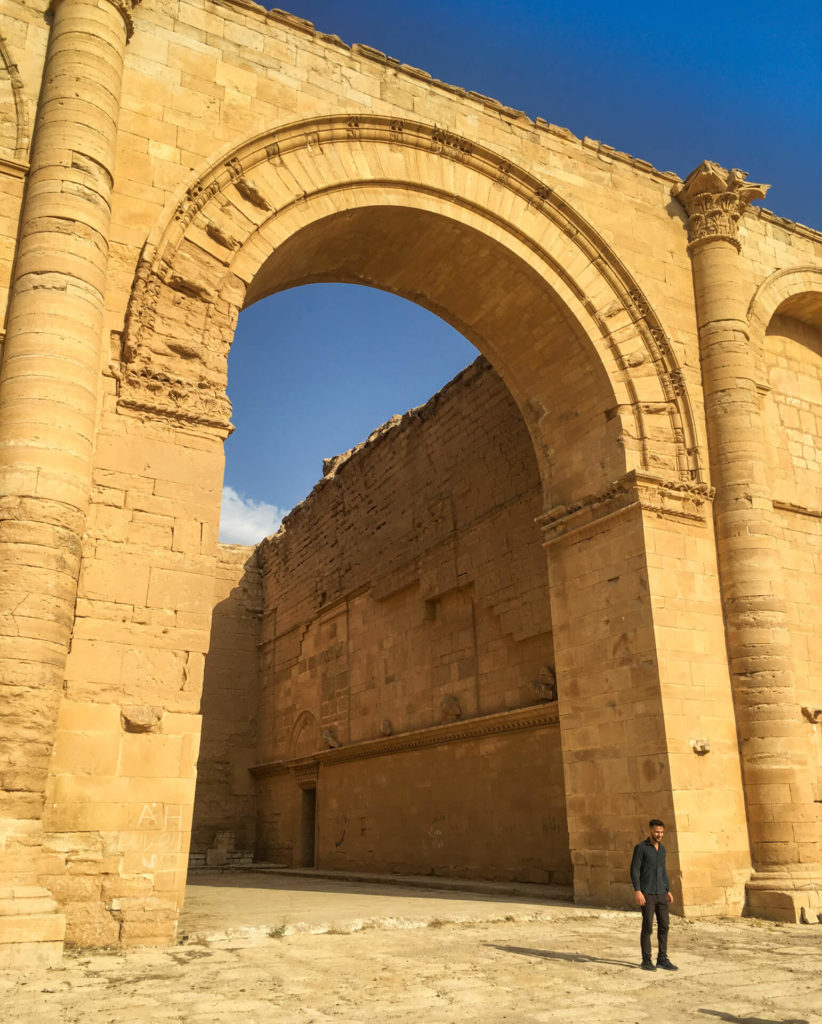
The main gateway to the halls of Hatra. The scale of the architecture is breath taking. It was restored under Saddam Hussain and fortunately wasn’t too badly damaged when ISIS passed through.
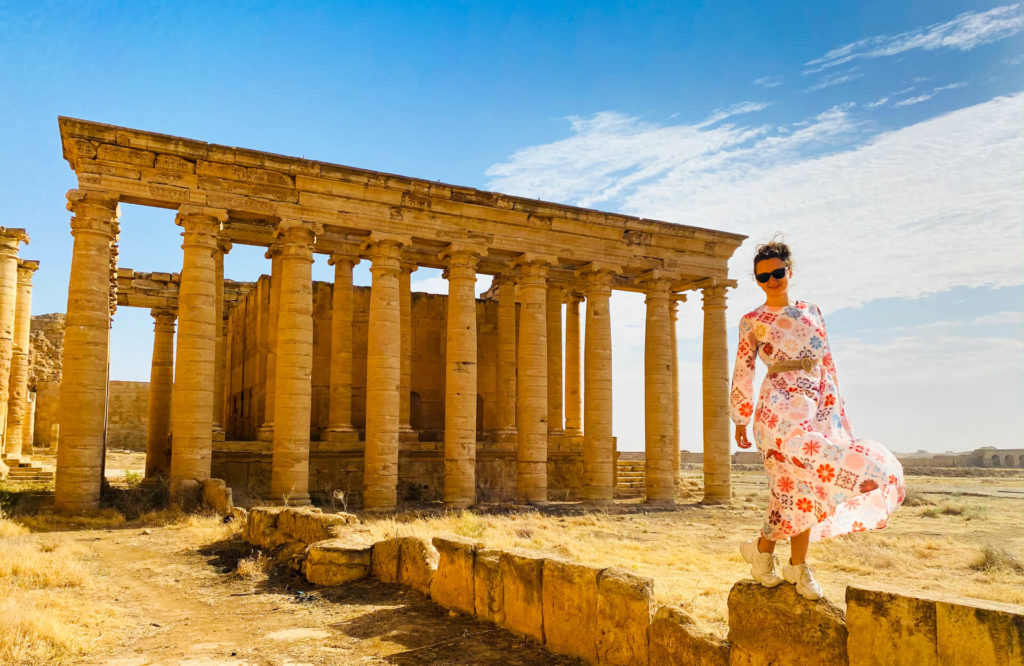
The ancient city of Hatra is completely closed to visitors, unless you know the right people!
It’s best to start networking while planning your trip, as local people will be able to give you the most up-to-date information in a country that is constantly changing. Either get on Couchsurfing and start messaging some locals or join the Iraqi Travellers Cafe Facebook page.
Local People Don’t know Everything
Iraqis are very helpful and will often give useful advice, but be aware that they often don’t understand the challenges that foreigners face. For example, we were told that “of course you can stay overnight in Samarra,” which is correct for Iraqis, but not for foreigners. Several Iraqis also told us that it’s not necessary for women to wear headscarves at checkpoints, which is technically correct, but they soon realised why Anna usually wore one after the whole bus had to wait half an hour when the soldiers realised we were foreign and asked a lot of questions.
Local people are very concerned about the wellbeing of foreign visitors and, as a result, can often be overprotective. We were told, “don’t take public transport, it’s dangerous for foreigners,” and, “don’t visit Mosul or Samarra, they’re not safe.” Listen to local advice and then make your own decision based on your own research and the level of risk you are willing to accept. However, if you’re going to Iraq in the first place, you’re probably doing this already.
Cost of Travelling in Iraq
Iraq is not a cheap country, but it’s also not expensive for independent travel. Baghdad is far more expensive than the rest of the country. The Kurdistan region is probably second to Baghdad and Mosul is definitely the cheapest. In Mosul, we had a delicious meal of kebab and about ten side dishes for 6k IQD – there was so much food we couldn’t finish it
Our main expenses were accommodation and transport. There are many mid-range and expensive options, but cheap (like less than $15 per person cheap) accommodation is hard to find. There are some hosts on Couchsurfing, although we didn’t stay with them. In most cities, hotel rooms start at about $20-30k IQD per person and double occupancy always costs more. Again, asking locals for recommendations can help a lot. Also, even in the more developed Kurdistan region, the options on international Web sites like booking.com are often relatively expensive. It can be better to just turn up and check out local hotels that do not have an online presence. On my first visit to Erbil, we found hotel rooms around the main bazaar for about $20 for two people, by just asking around.
Climate in Iraq
Both of my trips to Iraq were in May, which is definitely not the best time. We were actually lucky, as the highest temperature we experienced in the south of Iraq was 43 degrees. The week after we left, temperatures hit 48 degrees! If it gets too much for you, Sulaymaniyah is an amazing place to take a break for a couple of days, as it’s up in the mountains and consistently cooler than other parts of the country.
As a rule of thumb, the months to avoid are May to August. April and September will still be pretty hot, but the best time to visit is between October and March.
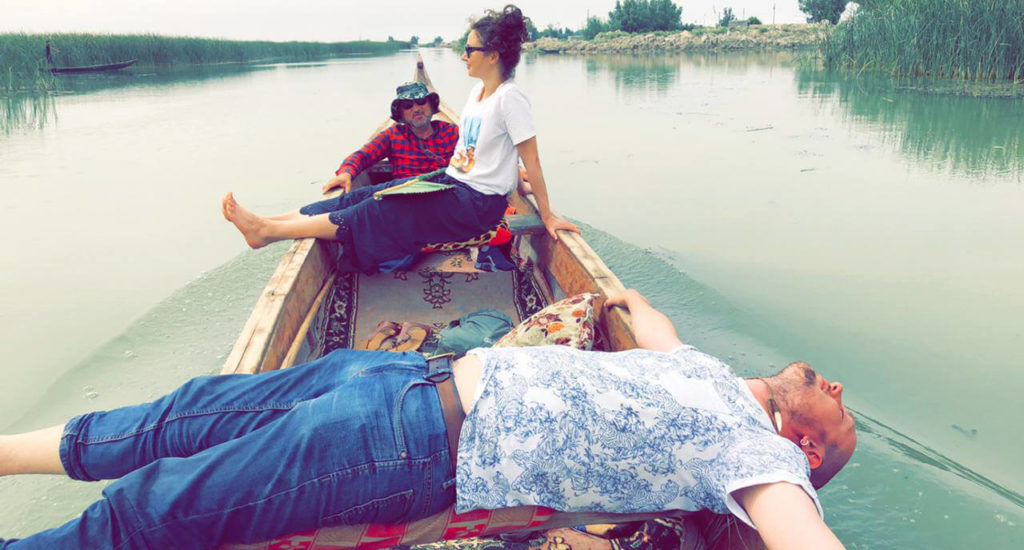
The temperatures in southern Iraq can approach 50 degrees centigrade.
Travelling in Iraq During Ramadan
If possible, avoid travelling to Iraq during Ramadan. We happened to be there during this period because that was the easiest time for me to get time off work. Most places were operating as normal, but a couple of places I had wanted to visit, such as the Shahbandar Café in Baghdad, were closed. Many restaurants were closed during the day, but in the end the impact was limited and we always found somewhere to have lunch. Some people, such as pregnant women and children, are exempt from fasting during Ramadan, so there are always a few restaurants open.
Safety in Iraq
Terrorism: What most people are worried about when visiting Iraq is terrorism and you should know that there is a small but very real risk of this. There are still militants, in some cases the remnants of ISIS, hiding out in the western deserts and mountains, in particular in the areas to the west of Fallujah and Mosul. The area around Kirkuk and the road between Baghdad and Mosul are also less safe than other areas of the country.
Terrorist attacks do occur from time-to-time in major cities. Just before I arrived in Iraq, a bomb killed four people in a market in Sadr City, a district of Baghdad (I would recommend to stay away from this area, as there have been several attacks there). A couple of days before I arrived in Kirkuk, ISIS attacked the Baba Gurgur oil field, which I visited. And, a couple of weeks after I left, there was a rocket attack on the US embassy in Baghdad. The rockets were fired towards the green zone from the other side of the Tigris river, but could easily have hit other areas. Another friend who was in Iraq recently mentioned that he didn’t feel completely safe in Tikrit, although nothing bad happened to him, due to the way some people were looking at him.
There is no evidence that militants are targeting foreigners and, although it’s always possible to be in the wrong place at the wrong time, it’s unlikely. However, by travelling in Iraq, independently or otherwise, you are accepting a certain level of risk.
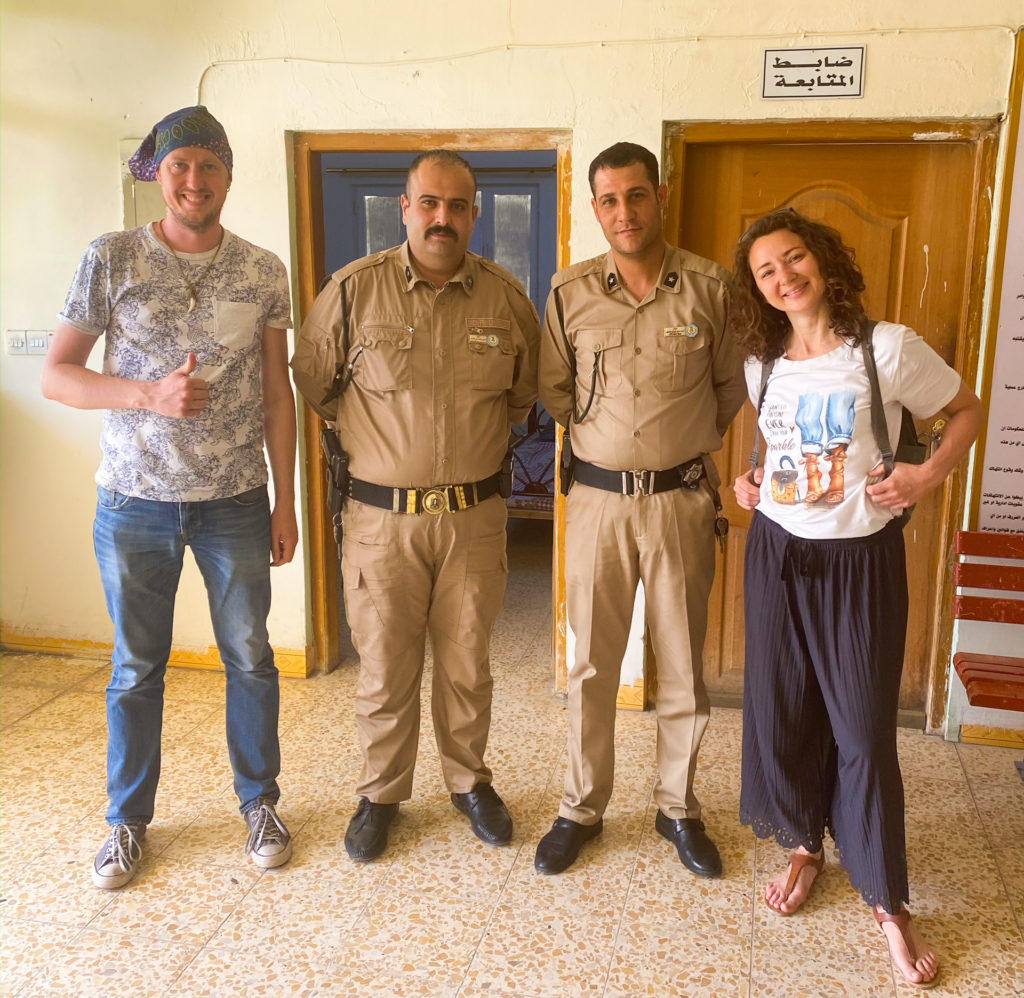
There is a huge security presence everywhere in Iraq and most of the soldiers and extremely friendly.
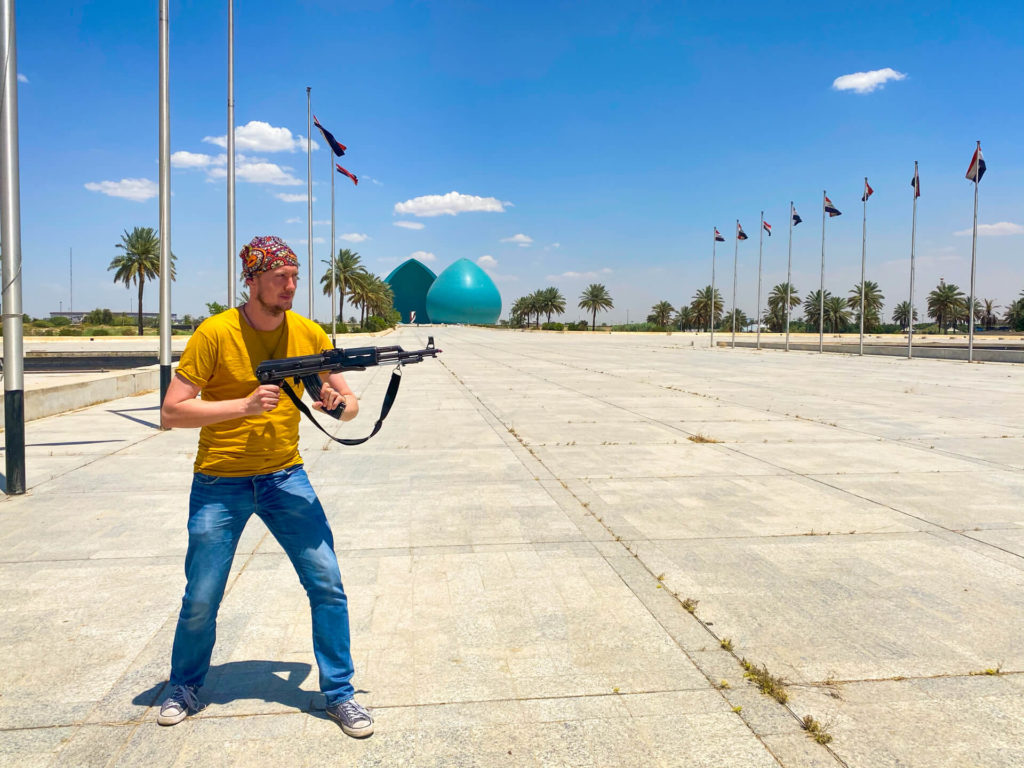
Many security guards and soldiers were happy to let us pose with their guns (and even fire them!). In this case, the solider removed the magazine when he gave me the gun, but then decided I looked a bit silly posing with it obviously unloaded and put it back in!
Crime: Petty theft is much rarer than in most European cities and people regularly leave their smartphones lying around in plain view. One morning, when I went to change money at the main bazaar in Erbil, I found a money changer’s stand with all his money in it (no lock!) just sitting there unattended on the edge of the street. When I asked another stand holder nearby, he told me he didn’t know where the guy was, but that he’d probably just gone to the toilet and would be back soon.
On my first trip to Iraq, my travelling companion and I took a local taxi that we hailed on the street to the long-distance taxi garage in Erbi, and then a shared taxi to Dohuk. A couple of hours later, when we were halfway there, the shared taxi driver, who didn’t speak any English, suddenly started miming taking photos at me in the air. When I didn’t understand, he made some phone calls and eventually handed me his phone. An Iraqi girl who spoke English asked me if we’d lost a camera.
I only had my phone, so I asked my companion and she suddenly realised that her camera was gone. The girl explained that the driver of the taxi we’d taken to the garage in Erbil had found it in the back of his taxi and brought it back to the garage. Other drivers there had told him that the two foreigners had taken a shared taxi to Dohuk and called our driver. “Don’t worry,” she said, “They’ll give the camera to the driver of the next shared taxi to go to Dohuk and you can pick it up from Dohuk garage this evening. That evening, we went back to the garage and, sure enough, there was our camera! I can’t see this happening in Europe.
Roads: By far the biggest danger in Iraq is the roads, especially when using public transport. Most shared taxis do not have working seat belts, particularly in the back, and the drivers think they are driving Formula 1. Luckily, the road quality is surprisingly good in most areas.
Sexual Harassment: This was the only danger that we experienced firsthand and only in Baghdad. Most Iraqis are very friendly and polite, but we encountered a few that seemed to not be used to interacting with women and lacked boundaries. In our case, we had two incidents of soldiers asking to take selfies with Anna and getting rather too touchy feely. There was also a guy selling water at the Allawi North garage who seemed very friendly, but suddenly started making lewd gestures at Anna behind my back. With the soldiers we walked away as soon as possible. With the water seller, Anna told him to stop it and he went away. All three incidents occurred in public spaces with many people around, so there was never any real danger of it escalating. Wearing more conservative dress did seem to reduce unwanted attention.
Unexploded Ordnance: If you’re into hiking, there are some great places in Iraqi Kurdistan. However, it’s best to stay on known paths unless you really know what you’re doing, as there are still many unexploded landmines lying around the hills.
Unsafe Buildings: Mosul is a very interesting place to visit, but some of the ruins are really unsafe. If you walk through them, you’re taking a risk, as parts could collapse at any time. Use common sense and avoid anything that looks particularly dangerous.
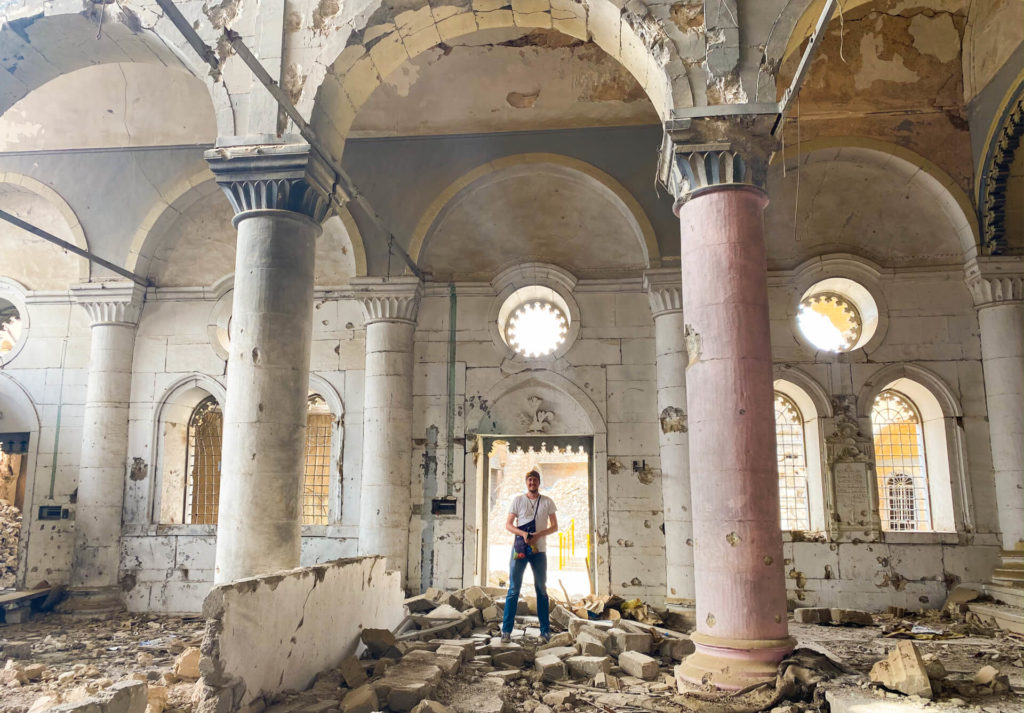
Many of the building’s in Iraq, like this once beautiful church, were badly damaged in the conflict with ISIS. This one appears structurally sounds, but some were obviously very unstable.
How to Stay Safe While Travelling in Iraq
You can never completely eliminate the risk inherent in travelling in Iraq, but the following can help:
- Plan your trip carefully and take into account advice from local people in-country before deciding which places to visit, especially if you plan to visit places outside of the more common destinations listed in this guide.
- Look purposeful when out and about (even if you’re lost!). This is actually a good tip in any country – you’re more of a target if you look like a lost idiot than someone who knows what they are doing.
- Be aware of your surroundings. If a place doesn’t feel safe, it might well not be, so leave.
- Don’t flaunt expensive possessions in public.
- Don’t wave large cameras in people’s faces or take photos of people without their permission. This applies to photos of anyone, but especially to photos of women and children. Basically, don’t be an asshole – ask yourself how you would like it if it was your family.
- Keep up-to-date with the news and look out for any indications of changes in the security situation.
- Hang out with local people. They will know the security situation and can also talk on your behalf in the case of any issues.
- Don’t go out alone at night. Although in most cases this is fine and I did it frequently, there is a greater risk than during the day.
- Don’t travel on the roads at night, especially in areas such as the road between Baghdad and Mosul, where ambushes are more likely.
- For women, wear conservative dress, especially in the more religious cities. We noticed that Anna attracted significantly less attention when wearing a headscarf and more conservative dress.
- Make sure that someone outside of Iraq knows your itinerary and stay in regular contact with them, so that they can raise the alarm if anything does go wrong.
Hotels in Iraq
We stayed at mid-range hotels recommended by local contacts, some of which were better than others. It’s normal for hotels to keep your passport at reception while you’re staying (some more securely than others). Insist on taking it with you whenever you go out, as you may be asked for it at checkpoints or by police or soldiers on the street.
Some hotels ask for a certificate of marriage before allowing men and women to share a hotel room. However, if both people are foreign, this rule is often not enforced. “Is she your wife or your sister?” is another question that gets asked. Not sure what proof they would want that a girl is your sister!
If you prefer to stay with local people, Couchsurfing can also be an option.
I stayed at the following hotels:
Baghdad: I stayed three nights in the Aqeela Tourist Hotel, in a very religious area near the Kadhimiya shrine. For the security of the shrine, there are multiple checkpoints that must be passed to enter the area, which is pedestrian-only for the last 200m or so. The hotel is nothing special and not cheap, but it’s interesting being surrounded by pilgrims and there is plenty of street food around. This was the most expensive hotel we stayed in at $70 per night for two people.
We also stayed one night at the Hala Hotel and Apartments near Karada, which was recommended by the Iraqi Travellers Cafe (the location is 33.306137, 44.448258 – here on Google Maps). It was nicer and cheaper than the previous one and run by a guy called Azoz, who’s a friend of Osamah, one of the guys who run the Iraq Traveller’s Cafe. He gave us a discounted price of $50 a night plus a free upgrade to a very nice suite. I also highly recommend a cafe next door called Samawer, which had an amazing breakfast.
Samarra: Currently, foreigners are not permitted to stay overnight in Samarra.
Najaf: We found a hotel right next to the mosque with a beautiful suite for 55k IQD (double occupancy) after some easy bargaining. Actually, it was quite bizarre – from the windows we could see the outer wall of the shrine, while on the inside it felt a bit like a brothel, with glitter on the blood red carpet and a lemon yellow jacuzzi in the bathroom! The hotel name is Qaser Alarab Hotel and it’s located here on Google Maps.
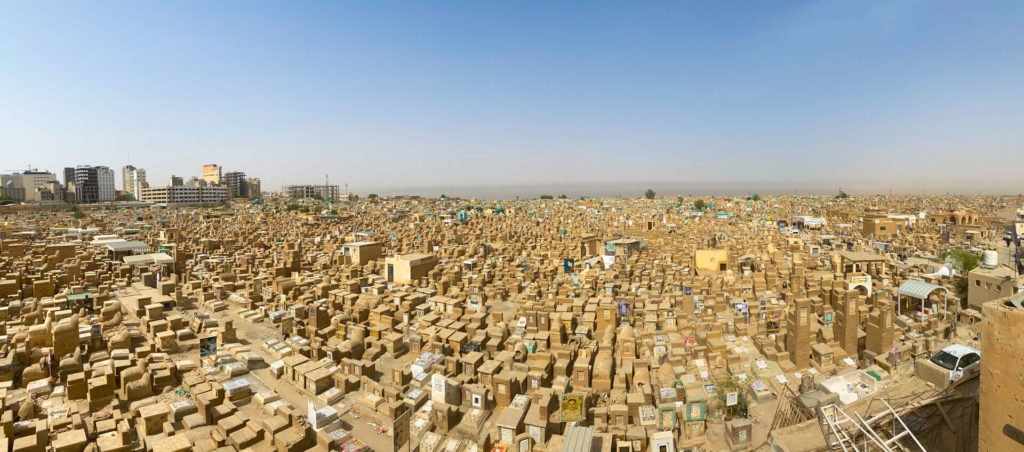
The Wadi-al-Salaam cemetery in Najaf is the world’s largest with over 5m graves.
Nasiriyah: We stayed at Ur Hotel, which cost 50k IQD per night for two people. It was basic, and the drain in our bathroom smelt a bit, but it was passable. Hotels in Nasiriyah may ask for a ‘sponsor’ – basically a local person who can vouch for you while you’re in the city. Network with locals or talk to the Iraqi Travellers Cafe before arriving and you’ll easily find someone who’s happy to help you out.
Kirkuk: We stayed at the Altun Saray Hotel, which was one of the nicest and cheapest hotels we stayed at during the whole trip. It cost 40k IQD (bargained down from 50k) per night for two people and the room was huge and beautiful.
Mosul: Hotel options are a little limited in Mosul. We checked out a couple of places and eventually settled on the Al Sultan Palace Hotel (located at 36.360169, 43.142648 – here on Google Maps) at 60k IQD a night for two people.
Sulaymaniyah: We stayed at the very friendly Dolphin Hotel and Hostel. The first night was during Eid and they were full, as was everywhere else. They were so kind that they actually offered for us to spend the night on the sofas in their common room for free! In the end, we stayed with a Nepalese friend that night, but returned the next night when there was a room available. It was 50k IQD for two people and the room was small but comfortable.
Erbil: We stayed at the Janet Bludan hotel, which a Kurdish friend I’d met on a previous trip there recommended. It was quite cheap (40k IQD for two people) and had fairly good Internet, which we needed as we were both working remotely that week, but was definitely nothing special.
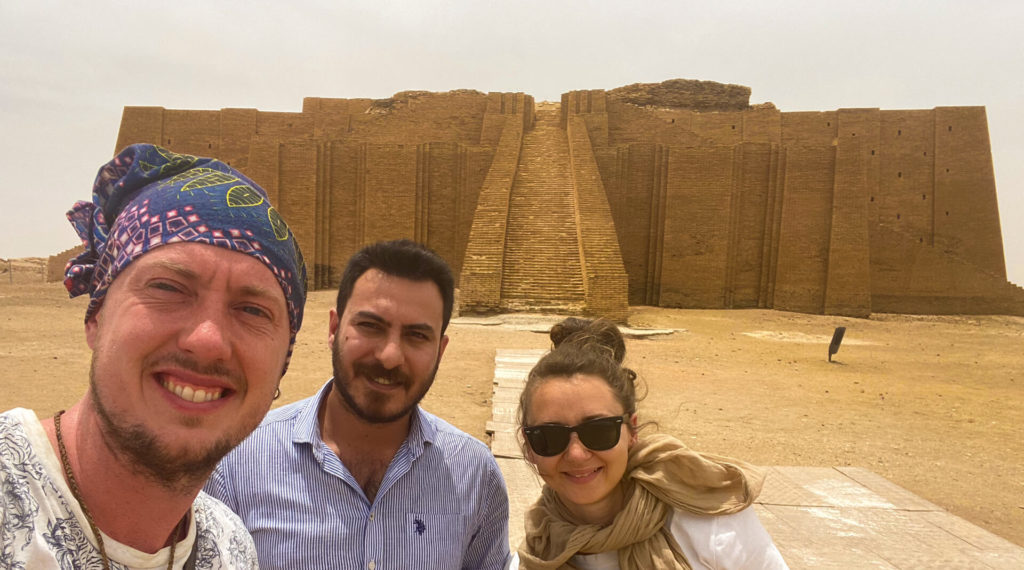
Exploring the spectacular Ziggurat of Ur with our friend Ghazwan, who we met through the Iraqi traveller’s Cafe.
More About Iraq
This is part of a series of articles I’m writing on Iraq. You can read more about my travels to particular areas as follows:
Life After ISIS: Visiting Mosul and Hatra
I visit Mosul, a city rebuilding brick-by-brick in the aftermath of ISIS, and the beautiful ruins of the ancient city of Hatra.
Babylon: Visiting the Fabled City
The Fabled City of Babylon Babylon is probably the most famous place in the whole of Iraq, despite the fact that the hanging gardens are long gone. Archeologists aren’t even sure that they were actually in Babylon! However, the archeological site is impressive, as...

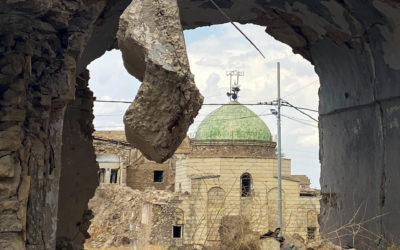
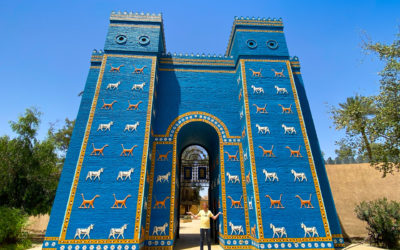
Incredible detailed report. Thank you so much! We are going to visit Iraq next month and this is going to be very helpful. I took so many notes.
I’d like to see more detailed report and photos of the cities too. I think you are writing them so hopefully more will be ready by next month.
Hi, glad the report was useful. I’m working on the cities. Mosul and Hatra will hopefully be ready next week .
Hello Rowan. That’s it’s a very super report. After read this one, I think will go to iraq instead of lebabon. Thank you. Will write on Facebook.
Hey Tommy, glad to hear it was useful. Even better – go to both if you have the time. I currently live in Lebanon and it’s totally different from Iraq, but also an amazing place.
Btw, VoA is available at Iran-Iraq border crossing in Shalamcheh! And at a few other spots, too, I believe!
Hi Viktoria. Thanks so much for this feedback. You’re right, land borders with Jordan and Kuwait also issue the VoA now. I have updated the contents.
Thanks for this very helpful and interesting report, I shall download it before I leave next month.
Best wishes to you.
What a fantastic guide. I’ll certainly be using this as a resource when I can finally make it to Iraq. My grandfather drove from London to Baghdad in the 1950s and I would love to see some of the places he visited.
Glad it was helpful. Your grandfather’s trip must’ve been amazing back in the ’50’s that was a real adventure, but many of the places he visited probably haven’t changed much.
Incredible detail in this, really what I needed!!
Awesome, glad it’s helpful 🙂
hello Steve,
i’m a 65 year old guy very much interested in travel and i traveled a lot.
Your report on Iraq intrigued me and i’m thinking to take a trip alone.
security is my only concern and i have not seen many mature foreigners traveling but only young guys.
Somehow i was not able to join Iraqi Travellers cafe on Facebook and i don’t know why.
There is a guy who organizes tour but he is in morocco.
Any suggestions in finding a local tour operator who could organize a 7-10 trip tour for me?
Yup are doing a good job! keep on doing it! We need guys like you in this crazy world!
Lino
Hi Lino
Not sure why I’ve become Steve, but okay, let’s roll with it!
As long as you’re relatively mobile, being 65 shouldn’t be a problem in Iraqi. Petty or violent crime against foreigners is not common. Yes, a lot of the people who go are younger guys, but that’s just because this demographic travels a lot, and actually I know several women who’ve backpacked Iraq solo too, all without any issues. As for tours, there’s a local agency called Safraty that I’ve heard good things about (although it’s not cheap). You can contact them here: https://www.instagram.com/safraty__/?hl=en. Hope this helps.
Thank you for this full travel guide!!
I just wanna ask you about PCR test. Do you know if PCR test is needed for internal flight? I mean, I wanna flight from Erbil to Baghdad.. from iraq to iraq.. but I dont know if I need test if I leave Kurdistan region.
Thank you dude.
Hi Tom
I’m not sure on this one, as I didn’t take any internal flights. I suggest you pose the question to the Iraqi Travellers Cafe (https://www.facebook.com/groups/754425071626757) – they can probably help you out with an answer.
great guide. thanks for this, it’ll be greatly helpful for my upcoming trip
Great to hear it was useful. Enjoy Iraq!
Hi Rowan
What an amazing read. Was glued to the screen lol.
Was wondering, I’m from UK but using Istanbul Airport to fly to and back from Baghdad. I know I need to show negative PCR when I arrive at Baghdad Airport, but do I need one when I return from Baghdad to Istanbul?
Thanks
Juber
Hi Juber
Glad you enjoyed the guide. Unless it’s changed since I was there in Many, you’ll need a negative PCR test to enter Baghdad airport. I think Turkey also requires it to enter – I suggest you check out the IATA travel restrictions page at https://www.iatatravelcentre.com/world.php. It’s usually a reliable source of information on entry requirements to different countries.
R.
Hi Rowan, I found your very well documentated report about Iraq and we, two seniors, decided to visit the cradle of our civilasation travelling independantly. A couple of years ago we travelled in Afghanistan without any guide and it was ok. See my website http://www.eriktrenson.be for my report and sme photos. I start preparing our trip in March and have two questions. What is the mail address of the Iraqi Travelers Café in Baghdad which I want to contact ? Let’s keep contact; we are from Belgium.
Hi Erik, that’s great you’ve decided to visit Iraq. I’m sure you’ll love it, it was one of the best travel experiences I’ve had. I Couchsurfed my way across Afghanistan in 2018, and Iraq is a lot easier! I don’t think the Iraqi Travellers Cafe have a mail address. You’ll need to reach out to them through their Facebook page.
Nice and detailed description. I plan to go to Iraq next spring. Many of your comments are very useful.
Great, enjoy your trip, I’m sure you’ll love it!
Thx alot for this useful comments and guide. I plan also a trip in Iraq in the future and your guide gives me great ispiration. According to you is it easy to travel as well by taxi and not shared taxi if I want to avoid going to shared taxi station and bargain. IS it necessary to plan in advance ( hotels, transport…) Thx for your answer
Hi Oliver, glad the guide was useful to you. For shared taxis, you will generally need to go to the shared taxi station. Bargaining is actually quite minimal in most cases, the shared taxi drivers are fairly honest and the prices generally fixed (private taxis are another matter). You can pretty much wing it if you want to, although if you’re on a budget, it’s better to plan a bit with the hotels, as accommodation in Iraq is not cheap.
Thank you so much for this. We plan to go end Feb. My husband works at Babylon since many years but this was still helpful as it will be the first time we will actually be ‘tourists’. Much confirms what we have heard from Iraqi contacts but it is good to get a perspective from A foreigner who travelled around. A bit concerned about the maniac driving though, the biggest danger in the Middle East.
Glad it was helpful. You’re right, being a tourist is very different to living in a country, but now is a great time to travel around Iraq with it being so much safer than before. I think the roads are the most dangerous part in many countries I’ve visited, from Indonesia to my current home in Lebanon. Enjoy your trip!
Hi Rowan,
This is a great article and helped us a lot for planning the next days here in Iraq.
Just a question on your experience, how expensive was the street food in Baghdad? We just paid 7000IQD for 2 small sandwiches and 2 tea and they wanted 10.000IQD for a Lahmacun. I feel that is very expensive…how can locals afford to pay 6€ for a flat pizza bread?
Anyway, we are looking forward to our daya ahead and hope to manage with the complete lack of arabic 😅
All the best
Heike
Hi Heike
Glad to hear the article was useful. Iraq is not a cheap destination, but you’re right, how do locals who are not rich afford such prices? I don’t know for sure, but my guess is that they buy groceries at low prices in local markets and cook at home. Certainly, that’s how it works in many countries I’ve visited.
Hope you enjoyed the trip!
R.
Hi Rowan
Thank you for a great write up. One burning question is on visiting Iraq during Ramadan, would you advise against this, I am a little like yourself in where I have leave from work in April which coincides with Ramadan, did it impact on the trip in anyway and were you able to see and visit all you wanted during Ramadan.
Also during Ramadan does normal life continue (markets, shops open during the day)?
Hi Paul, glad the write up was useful. I was actually in Iraq during Ramadan. Most things still operate, like public transport, tourist sites, etc. Most restaurants will be closed during the day, but as some people are exempt from fasting (children, pregnant women, etc.), you’ll always find somewhere to eat if you ask around, so it’s not really a problem. The one thing that was a pity was that the Shabandar cáfe on Mutanabbi street in Baghdad was closed, but otherwise life is pretty normal and markets and shops still open. If that’s the most convenient time for you to visit, I would go for it.
Hi Rowan,
Thank you for the notes. This is super helpful. I’m planning my trip from Barsa to Baghdad next November.
Let’s keep in touch
Hi Domenico, great to hear from you and glad the article was helpful. I’m sure you’ll have an amazing trip!
Hi Domenico, I am also planning a trip from Barsa to Baghdad this November, most likely arriving in Barsa on November 3rd, would be great to meet up if you are still planning on travelling
Hello Rowan.
Thanks so much for your very efficient reports with all essential details.
I will be arriving in Baghdad on the 9th of October. I’m curious to know how you found your hotel and why you chose it over the hotel suggested by Travelers Cafe like Diwan.
Thanks so much.
Antonio
Hi Antonio, great to hear from you and glad the blog was useful. I stayed in two hotels in Baghdad. The Aqeela Tourist Hotel was recommended by a friend who stayed there a little beforehand. Honestly, it was overpriced, by very convenient for the Kadhimiya Shrine. The second one near Karada (33.306137933568735, 44.44825828434649 on Google Maps) was actually recommended by the Iraqi Travellers’ Cafe and was much better. If they’re recommending one, I would go with that. Enjoy Iraq!
Iraqi travellers group hasn’t approved my request to join the group for 5 days. Are there any other contacts you know of that can help me get a local contact to help me get through the checkpoints?
Hi, yes, quite possible. Please sent me a message through the Quit & Go Travel Instagram (@quitandgotravel).
Hi Rowan!
I hope you’re well.
First of all, thank you for sharing your trip to Iraq.
I have a question. What time did you arrive at baghdad airport?.
Our plane arrives at midnight. I don’t know if there are still minibuses at this time?
Thanks
Miguel
Hi Miguel.
Glad to hear the article was useful. I arrived in the afternoon, so there were minibuses. Anna arrived at night though and there were no minibuses. She had to take a taxi. Hope this helps.
Rowan! I loved your blog! It’s the perfect brief exaplanation we need to know . congrats. it helped me a lot
Hi Lucia. Thanks, glad it was helpful 🙂